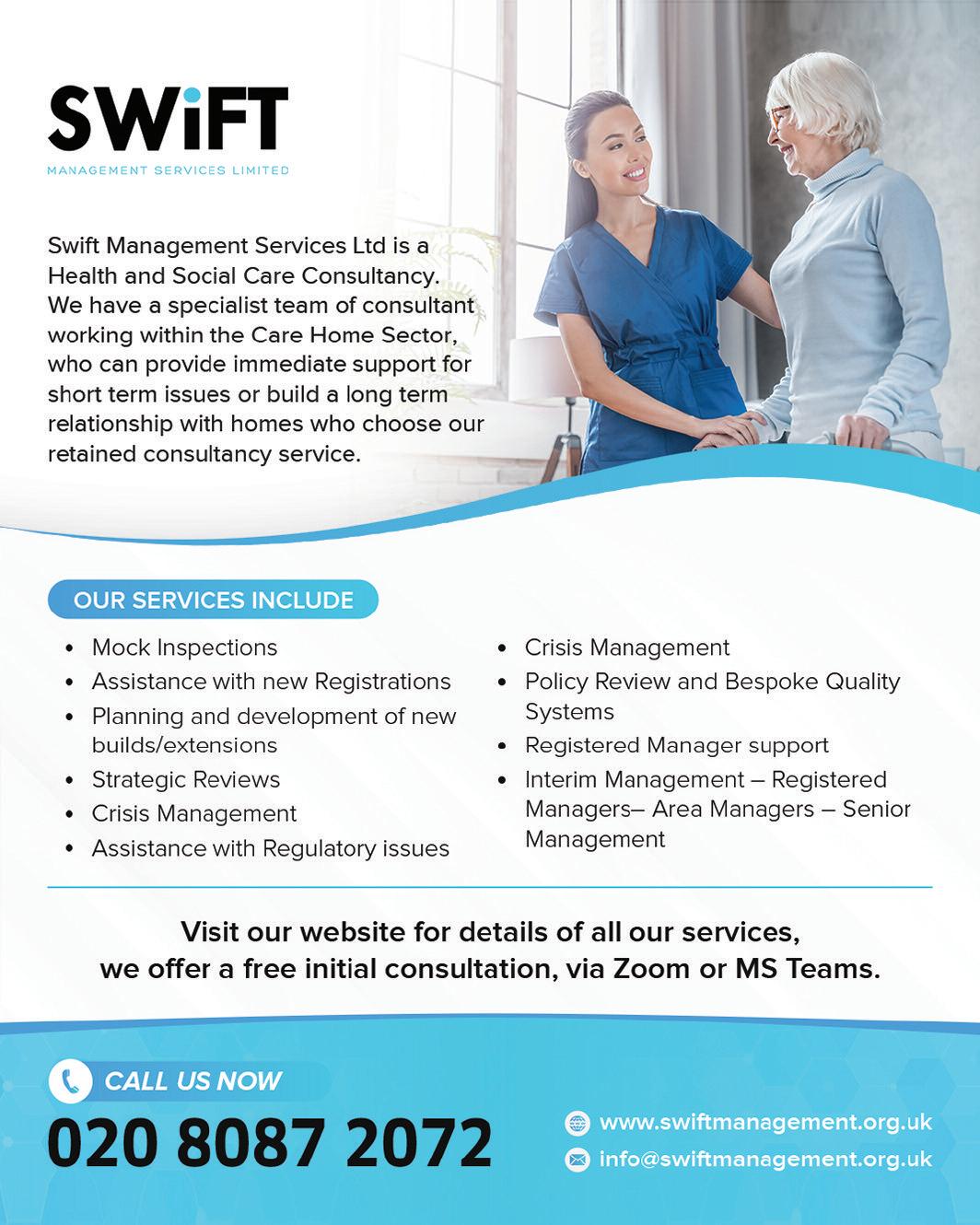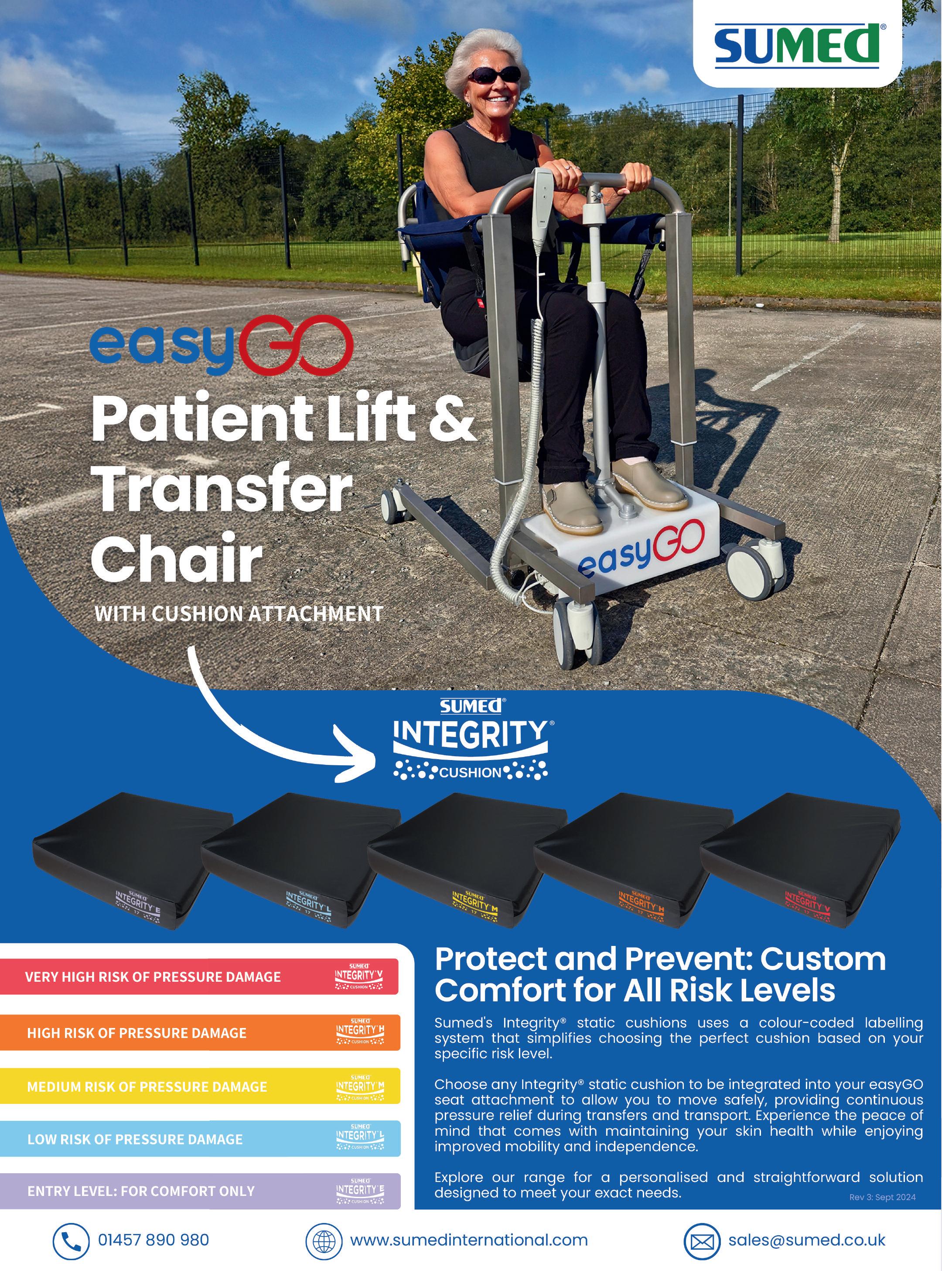















However
Professor
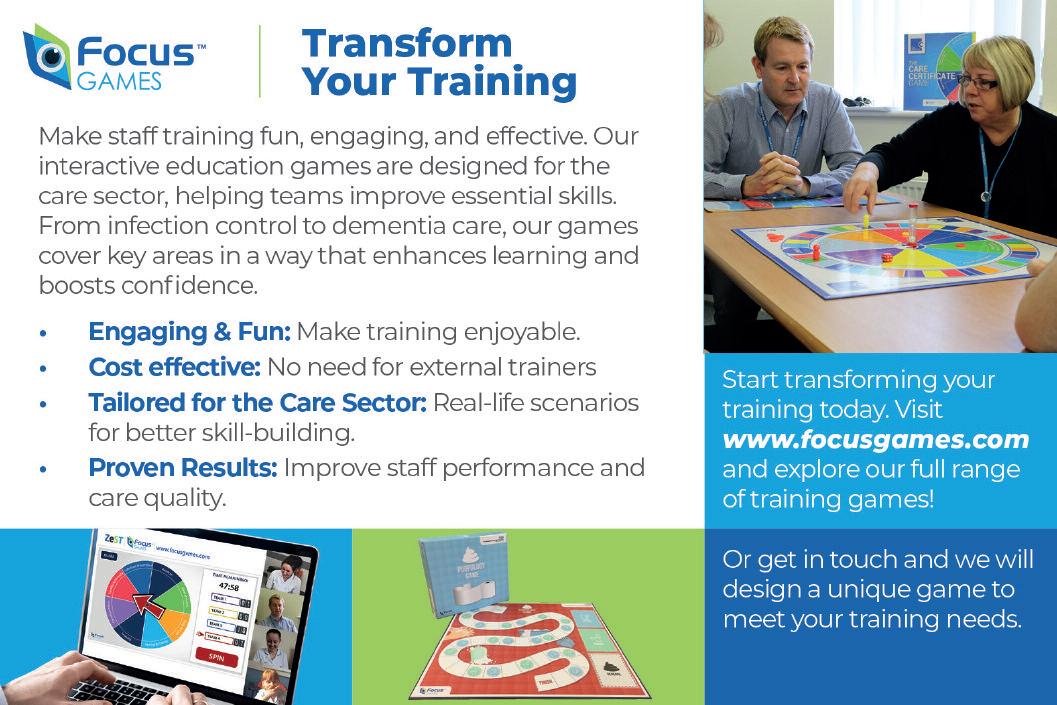


Editor Peter Adams
As the Care Quality Commission (CQC) recently published its annual assessment of health and social care in England it [once again] brought to light both progress and enduring issues within the sector
While there have been commendable strides in the quality of care across various providers, this year s report reiterates that deep inequalities persist, especially for those in the most deprived communities
This assessment gives rise to ongoing concerns from care sector organizations, who warn of a stark and widening divide a two-tier system which was highlighted last year in which social and health care disparities are directly tied to socioeconomic status
One of the most pressing issues highlighted this year is the continuing crisis of delayed hospital discharges
These delays not only place significant strain on hospitals but leave residents in need of social care without proper timely support
The knock-on effect has been intensified pressure on local authority-funded care which while working valiantly to accommodate those in need often struggles to meet increased demand in a sector that is already stretched thin
The situation is exacerbated by regional disparities where life expectancy and access to essential services are frequently hindered by deprivation In fact the 2023/24 figures on urgent and emergency care attendance reveal a sobering reality: people in England s most deprived areas are nearly twice as likely to require urgent and emergency services compared to those in more affluent areas
Todays budget has, as I write this just finished, and I wait comment for the sector suffice to say there is additional funding for social care, I understand that the chancellor intends to “deliver a significant real terms funding increase for local government next year including £1 3 billion of additional grant funding to deliver essential services with at least £600 million in grant funding for social care ”
Will that be enough? I suspect will make very little impact we really needed a clear message that the government is serious about supporting and improving the
long-term health and care of the nation and much much more needs to be done!
On a side note we also have the privilege of celebrating the inspiring stories of resilience compassion and dedication that define this sector
Every November we are honoured to share the heartwarming stories and tributes from care homes around the UK in remembrance of our armed forces on November 11 Last year s 6-page Remembrance Day tribute (which can be seen here) was a testament to the meaningful and cherished memories that the care community holds honouring those who served and those who continue to give their all in the spirit of care and remembrance We look forward to producing this year s tribute and invite our readers to send in news of any upcoming events, tributes, fundraising activities, or personal stories of residents who have been part of or involved in our armed services
I can always be contacted at editor@thecareruk com and encourage our readers to sign up for our bi-weekly digital newsletter at www thecareruk com and follow us on social media for all the latest news
At THE CARER, we are calling on our readers for help.
As you may have seen in our appeal for support The CARER has always been delivered in print and online free of charge since 2004, including the sector s only weekly digital issue
We are committed to keeping you informed with the latest news, views, products, and services on the sector's most popular adult social care website www thecareruk com , which receives almost 4,000 visits and 26,000 page reads every day

However, with costs rising significantly, we recently put out an appeal for support
We extend our heartfelt thanks to readers who have responded and pledged their support with a £10 donation covering the next two years and thank you also for your very kind words of support too!
Your contributions are invaluable and if you haven t yet pledged please do consider supporting us so we can continue delivering quality content
For details on how to contribute please visit www thecareruk com/subscriptions/


This lack of alignment between demand and provision is resulting in vulnerable people not receiving the timely support they desperately need Now more than ever urgent action is required to address these critical shortfalls
”
Key Findings Highlighted by Care England Include:
• Rising Demand and Service Gaps Demand for local authority adult social care has surged with a marked 27% increase in unmet requests since 2017/18 This stark trend reflects a lack of alignment between increasing needs and available support
Delayed Discharges from Hospitals: The report reveals that in April 2024, delays for care home beds and home-based care contributed to 45% of patient discharge delays after 14 days in an acute hospital These delays reflect a strained system in which pressures on the care sector often prevent it from accommodating individuals ready to transition out of hospital settings
Regional Disparities in Care Provision: Pronounced regional disparities persist with the North East reporting the highest rates of delayed discharges due to insufficient home-based care, while London leads in delays driven by limited availability of care home placements
• Staffing Pressures and Recruitment Challenges: Although care home vacancies are at a three-year low international recruitment has sharply declined with an 81% decrease in overseas worker visa applications between 2023 and 2024 This trend poses serious risks to workforce stability and care continuity
FINANCIAL STRAIN
Professor Green continued: “The CQC’s report underscores the urgent need for targeted funding and support Without sustainable solutions to recruitment challenges service gaps and regional inequalities the system will continue to struggle because of increasing need which is not matched by supply We cannot afford to overlook the well-being of those relying on our services It is imperative that the Government in partnership with the sector steps up to provide the resources and support needed to strengthen the foundations of adult social care
“The report underscores the financial strain on providers with inflation and workforce challenges eroding resilience which are set to worsen given the changes to international recruitment numbers as reported in the recent Skills for Care report Although care homes show promising occupancy returning to pre-pandemic levels they face reduced reserves, operational uncertainties and financial surplus at its lowest levels ever Meanwhile a 34% rise in registered homecare services since 2020 contrasts with a slight decline in care homes and beds revealing a shrinking residential care market not aiding hospital discharges This shift highlights an urgent need for balanced capacity and equal access to services across regions to ensure sector sustainability
through essential reforms and investment
“Providers are operating under immense financial strain Recent unfunded inflation coupled with escalating workforce costs has left many organisations vulnerable The resilience of adult social care must not be taken for granted We need proactive equitable funding to ensure that our sector remains stable and capable of supporting both our communities and the broader health system
This reduction in care home availability poses a serious challenge for a sector already under pressure While expanding homecare services is beneficial we must not overlook the need for residential care especially as our population ages A balanced system requires both homebased and residential care options accessible in every region It is essential for the Government to work with us to ensure that everyone who requires residential support can receive it wherever they are and wherever they choose to call home
INEQUALITIES PERSIST
The report highlighted that timely access to good care continues to be a struggle for many and inequalities in care persist And issues getting access to services are often exacerbated by deprivation; in 2023/24 attendance rates for urgent and emergency care for people living in the most deprived areas of England were nearly double those for people in the least deprived areas Analysis conducted for CQC showed that for people attending for mental health reasons the difference was over three times higher for those in the most deprived areas
Mental Health Concerns
Mental health services are also a cause for serious concern Lack of resources ageing estates and poorly designed facilities are affecting the safety of inpatient wards CQC’s special review of the care provided by Nottinghamshire Healthcare NHS Foundation Trust also identified wider concerns around community mental health services leading to recommendations to improve oversight and treatment of people with serious mental health issues
TWO TIER HEALTH SYSTEM
Last year’s State of Care warned about movement to a two-tier healthcare system – where those who can afford to pay for treatment do so and those who can’t face longer waits and reduced access this the report says remains a concern with inequality the key theme
Life expectancy for those with a learning is disability lower than the general population deaths in the most deprived areas were three times higher than in the least deprived areas Only around a quarter of people with a learning disability were recorded on the register meaning three quarters were missing out on the care and treatment they were entitled to
Reviews also identified that those with autism or learning disabilities continued to be institutionalised inappropriately when they should be receiving community care and that excessive restrictive practices were still in use
James Bullion Interim Chief Executive of CQC said: We have consistently highlighted the fragility of the adult social care sector – and the situation remains precarious ”
The number of new requests for local authority adult social care support that resulted in no service being provided has increased by over quarter over the last 5 years And in April this year waits for care home beds and home-based care accounted for almost half of delays in discharging patients who d been in hospital for more than 14 days Nearly 4 000 people are delayed on an average day – that s 50 doubledecker buses full ”
“While vacancies in adult social care have dropped slightly the average staff vacancy rate in social care is still nearly three times higher than in the national workforce – and care workers despite the crucial job they do, remain among the lowest paid members of society ”
“Some providers are struggling to provide good safe care – but there are also many outstanding adult social care providers who put the people they care for at the centre of their decision making as the case studies included in this report demonstrate ”
DEMENTIA CHALLENGES
The report also shone a light on health and social care challenges faced by around 826 000 people living with dementia in England and the CQC has stated that it wants regulatory work to influence and drive improvement in the provision of care services for people living with dementia by developing a cross-sector dementia strategy shaped by the central question How can CQC use its role to improve the experience of using health and social care services for people living with dementia and their carers?’
Tim Baverstock Head of Local Systems Influencing at Alzheimer s Society said: Dementia is a progressive and complex condition It affects everyone differently, which is why people with dementia need quality personalised care that meets their needs Shockingly only 29% of care workers in England have received any dementia training
These findings further reinforce our calls to government for social care reform and mandatory dementia training for care workers It is imperative staff have the right skills and knowledge to deliver care that meets an individual s needs
"We also need to see increased access to an early and accurate dementia diagnosis Failing to diagnose leaves people without the support care and treatments they need to manage their symptoms and can result in far greater costs down the line
“This report’s findings show that dementia cannot, and must not, be ignored Alzheimer’s Society welcomes the development of the CQC s dementia strategy and CQC regulatory work to ensure that everyone living with dementia receives high-quality care support and treatment they deserve "

By Greg

With more than 17 000 properties located throughout the UK, the care home sector represents a not insignificant contribution to UK carbon emissions from its building stock 40% of those emissions are generated through the process of heating cooling and lighting When demands are high water heating has the potential to be the most energy intensive process of all accounting for up to 30% of daily energy use making it an obvious target to address
In general terms most care home organisations today claim to be prioritising sustainability to meet mandated environmental reporting needs, building regulations and to attract environmentally conscious customers and investment Renewable heating is seen as a potential contributor to all these goals Building regulations are without doubt the main driver for change and new builds with higher levels of insulation and a moratorium on new gas connections will by default specify renewables But if we look at the five year period from 2019 through to 2023 despite applications for new care homes rising steadily across the period, the numbers are relatively low, spanning 110 to 221 projects per annum With project completions averaging 100 new care homes every year representing just 0 6% of the total UK care home real estate Refurbishment accounts for most of the work carried across the sector and with 70% of the existing care home building stock expected to still be in use by 2050 that will continue to be the case This means the industry faces a huge challenge in terms of refurbishing buildings with energy-efficient technologies
To better understand this challenge Adveco commissioned a report into the adoption of technology for water heating over the 2019-2023 period Although all lower carbon technologies - electric water heating, air source heat pumps (ASHPs) and solar thermal - are showing increasing specification adoption rates have remained generally low across the sector Of these low-carbon technologies ASHPs have exhibited a more rapid uptake in the past two years but the number of sites deploying the technology remains lower than expected and are almost exclusively associated with new build Of those undertaking retrofit or replacement of existing systems our research indicates that gas-fired water heating continues to dominate It accounted for 88% of recorded installations across the sector making it by far the most popular choice for
supplying heating and hot water demands
Unplanned replacements are particularly common It was an issue faced by Woking Homes this year
Despite the wealth of options available straight replacement where gas connections exist remains one of the simplest, most cost-effective and low impact decisions a care

home operator can make Woking Homes worked with Adveco for fast specification supply and rapid commissioning of the replacement system For this building it was the correct decision and the owners have new more efficient gas water heaters which reduce energy demands leverage lower energy costs (at the time of writing gas costs 5 48p per kWh (kilowatt hour) versus electricity at 22 36p per kWh) and offer a bridge to next generation technology in the future Most current generation gas water heaters already have the capability to combust 20% blends of natural and hydrogen gas
gies required to be deployed nationally through the 2040s and on past the
result we estimate gas water heating in its current
Gas on its own cannot be the
carbon preheat reducing emissions from gas top up or costs associated with all electrical water heating These applications assure robust, delivery of hot water at necessary temperatures (+60 ) to meet safe commercial operations and sustainability goals care home operators
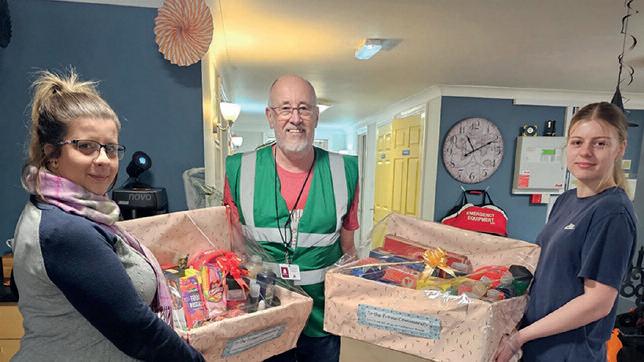
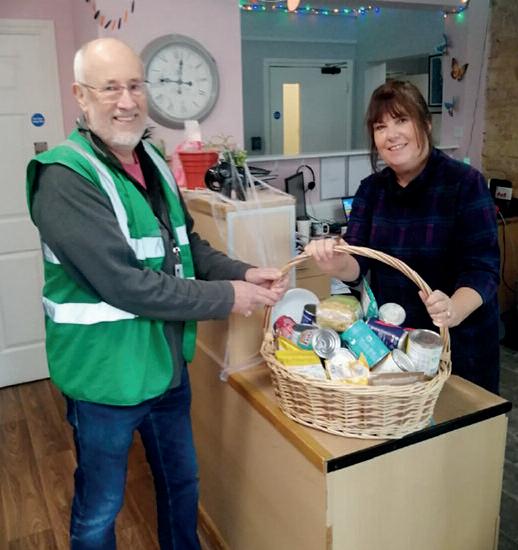


We may be approaching the end of October, but that didn’t stop Green Lodge Care Home in Billingham from participating in the annual Oktoberfest last week
Colleagues and those who live at Green Lodge fully embraced the event which also welcomed residents families and friends The care teams donned traditional Bavarian attire, complete with lederhosen and festive accessories
The party involved beer tasting, featuring 20 different varieties to try The Chapel an event space in Middlesborough donated some of the harder-to-find beer to give back to the community which the residents loved Clair Osborne Activities Coordinator at Green Lodge said: We all had a blast at our first Oktoberfest; our people enjoyed the time to relax with family and friends giggling and chatting together They really loved sampling lots of different craft beers, lagers, and shandies ’’
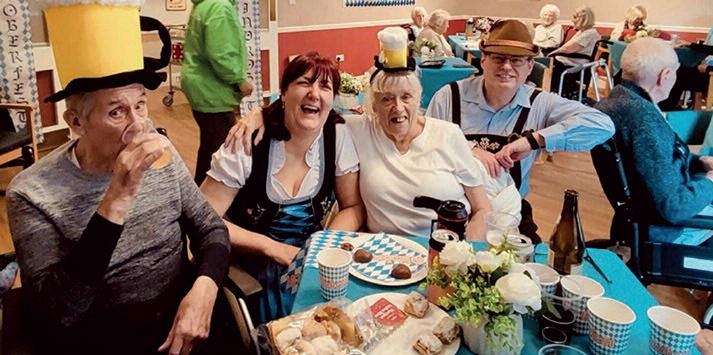
She added: “Our kitchen team went all out and put on a grand spread featuring classics like pretzels and bratwursts Jen Cialis who lives at the home said: “It was absolutely marvellous just wonderful! There were so many tasting options everything about the afternoon was superb Val Cook, who also lives at the home added “I thought it was brilliant I want to go to the next one! I ve never had the
to taste
so many different beers ” Resident John Wall said I ve been to the real Oktoberfest in Munich many years ago so it was nice to reminisce about it I thought we had a good selection of unusual beers to try and it was a special treat for us beer drinkers John


Earlier this month, Kim Leadbeater MP formally introduced the assisted dying bill in the House of Commons and the 29th of November will mark the first time the issue has been debated in Parliament in almost a decade The text of the bill has not been published but its title states that it would “allow adults who are terminally ill subject to safeguards and protections to request and be provided with assistance to end their own life The bill raises many important and challenging questions for health and care professionals
UNMET NEED IN END-OF-LIFE CARE
Sue Ryder is a national palliative care and bereavement charity We take a neutral position on the issue of assisted dying but we are adamant that palliative care must be improved and that no one should suffer because they can’t access the care they need
Research shows us that 90% of terminally ill people would benefit from palliative care before they die and yet just 50% of people receive it We know that access to healthcare is unequal, particularly in palliative and end-of-life care with disadvantaged communities having poorer access to healthcare
The need to improve access to palliative care should be a unifying thread in this debate Regardless of whether the law changes the Government must end the post code lottery in palliative care access And on
November 29th all MPs must recognise that any debate on assisted dying must have improvements in access to palliative and end-of-life care at its core NEW CONSIDERATIONS THAT COME WITH ASSISTED DYING
At this stage it is impossible to pinpoint exactly what any new laws on assisted dying may look like However palliative and end-of-life care is about providing holistic care and because its patient population is people with a terminal illness the sector can t shy away from the fact that it will have some responsibility around this issue if it is legalised

By Jane Turner, Chief Nursing Officer, Sue Ryder (www.sueryder.org)
Patients, and residents, must always feel able to discuss all aspects of their care with health and care professionals Choice and agency are hugely important to people within the care system Conversations may push people beyond their comfort zone if assisted dying is legalised, but health and care professionals must still respect people s choices
What is abundantly clear however is the essential need for all health and care staff including hospice staff to receive training This will certainly be needed if assisted dying is legalised but already residents in care homes and patients in hospices will have questions about assisted dying and staff need guidance on how to manage these delicate and deeply personal conversations
The importance of understanding the impact on staff wellbeing that could come with involvement in assisted dying is also a concern that needs thought Anyone participating in signing off someone’s decision, or prescribing life-ending medication would need to have enhanced training on areas such as prognostication identifying coercion and assessing mental capacity
It is not only supporting a patient to end their life that could have a significant impact but working in a place where this happens could also be extremely difficult for many people We must recognise that even merely signposting people to assisted dying if it is requested will be difficult territory for some, especially if it conflicts with their own beliefs Some health and care staff may wish to opt out of work to do with assisted dying, so robust protections would need to be established to allow them to do this
THE ONE CERTAINTY THAT GOVERNMENT MUST DELIVER ON
End-of-life care isn’t a “luxury” or a “nice to have” How we die is important not just for the person dying but the people around them Regardless of the ongoing assisted dying debate the Government needs to act now to ensure the sector can meet the needs of everyone with a terminal illness now and in the future
For some people an assisted death is an option they will want even if the gaps in end-of-life care are fixed But, regardless of where people sit in this debate, it is paramount that no one should be made to feel that an assisted death is their best option because they cannot access vital end of life care The bill may raise a lot of questions but surely the need to fix access to palliative care in people’s homes care homes and hospices is something we can agree on






The
It

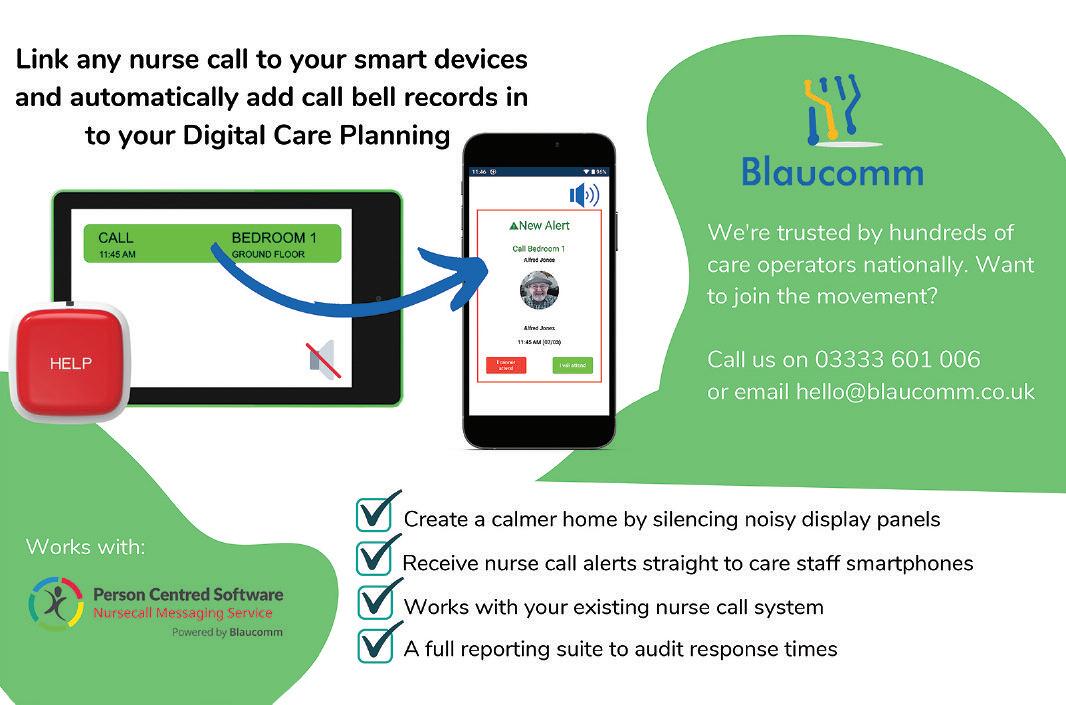





Understanding the process for assessing mental capacity is crucial for any attorney who wants to act under the terms of a lasting power
attorney, according to a lawyer who specialises in sup-
or
Mental capacity refers to a person s ability to make decisions for themselves The Mental Capacity Act 2005 sets out a twostage test to assess mental capacity Firstly does the person have an impairment of their mind or brain, and secondly, does any such impairment mean the person is unable to make a specific decision when they need to?
Lucie Glover, an Associate in Furley Page’s Elderly and Vulnerable Client Team (www furleypage co uk) said: The mental capacity assessment process is intended to ensure that individuals wishes are respected and legally binding protecting their autonomy while safeguarding against potential abuse
“The mental capacity of your loved one will have been assessed when they made the lasting power of attorney but determining whether someone has the necessary capacity to make a decision when they are deteriorating is not always straightforward
You must assess whether evidence of deteriorating capacity is part of a broader decline that impacts the person s ability to retain understand and weigh information, and communicate their decisions This is a sensitive judgment call and if there is any doubt or concern it is crucial to consult a solicitor
“In addition to this any decision or act done by the attorney on the person’s behalf MUST always be done in that person's best interests What acting in someone s best interests means is not always readily understood and can cause problems for the attorney if they act inappropriately It is always a good idea to take professional legal advice to be safe ”
For a health and welfare power of attorney you can only start to make decisions for the donor when they are unable to make decisions relating to any aspect of their health and welfare for themselves By contrast for a financial power of attorney subject to the terms of the document you can help your loved one with financial decisions and actions from the time that the power of attorney was registered, if you have their consent while they have capacity and you always act in their best interests
Lucie continued: When it comes to assessing mental capacity for the purposes of acting under the authority of the lasting power of attorney your loved one’s doctor is often the key professional involved Attorneys must act in the donor s best interests and follow any instructions or preferences
“Caring for someone with a mental impairment carries a lot of responsibility A qualified solicitor can advise you on how to conduct or facilitate a mental capacity assessment ensuring compliance with all legal requirements ”
It will come as a surprise to no one that care is approached differently, in different parts of the world Cultural differences make an enormous difference In France there are dementia villages without boundaries to the surrounding town but through design, the residents stay put and people from town come in to enjoy shared









By Lori Pinkerton-Rolet PPBIID, IIDA, Reg ID
experiences with them In Japan where there are simply not enough younger people to look after the elderly they have devised clever design strategies which allow them to operate with lower staff ratios than we generally employ in the West The concept of an information hub related specifically to care retirement and dementia interiors led to the development of the ThirdAge Design podcast and website with listeners in 63 countries Why was this necessary?
UNLOCKING RESEARCH
The breadth of this topic is enormous and operators designers and architects are generally time-poor
The Universities of Sterling Newcastle and Hertfordshire are wellrespected in conducting research, but a wider breadth of information available from other countries which we might adapt to suit UK needs
Generally this must be accessed via individual academic portals to which you must subscribe which can be both time consuming and expensive
Simply put the research tends not go to the people who can implement the work
INTERNATIONAL INSIGHTS
Supported by Wissner-Bosserhoff

The Third Age Design (TAD) provides an interactive international community hub for care, retirement and dementia design with transcripts translated into 12 languages in addition
Care England has marked Young Onset Dementia Awareness Day by launching resources designed to raise awareness and advocate for urgent government action to support individuals living with Young Onset Dementia (YOD) across England
YOD develops under the age of 65 sometimes as early as in one s 30s and poses distinct challenges including delayed diagnosis economic strain significant impact on work and family life and the absence of age-appropriate care services The current care pathway in England often fails to meet the needs of these individuals, leaving many without the tailored support they need to live well
Professor Martin Green OBE, Chief Executive of Care England, commented Young Onset Dementia is a growing crisis that demands immediate attention People living with YOD face a long journey of misdiagnosis inadequate support and social isolation As the voice of the social care sector Care England calls on the government to take decisive action invest in age-appropriate care facilities, ensure funding for community services and train primary and secondary professionals to recognise and respond to the unique needs of those with YOD Without these changes we risk leaving thousands of individuals and their families without the support and dignity they deserve ” Jill Quinn MBE Chief Executive of Dementia Forward the charity
behind Young Onset Dementia Awareness Day also emphasised the need for immediate action “As the leading dementia charity for York and North Yorkshire we understand the profound impact of young onset dementia on individuals and their families The average time to diagnosis remains unacceptably long and too often people affected by YOD are left isolated without the right support ”
“At Dementia Forward we believe in a community-based approach that integrates support into the everyday lives of those affected We urge the government to prioritise YOD in their policies ensuring that individuals receive tailored care and the opportunity to live well within their communities This day is about raising awareness but it s also a call for action
Karen Thomas Head of Young Onset Services at Dementia Forward continues: ‘We have been supporting people of working age with dementia for 11 years and have proved that a different approach to support is essential to meet the unique challenges that these families face
“They deserve to be seen and heard and for actions to be taken For a number of years people with young onset dementia have made up 7 5% of our caseload in North Yorkshire; the national statistics have now caught up to the
Bupa Care Services has announced a 12-month partnership with Be Great Fitness a community health and wellbeing company dedicated to transforming elderly care through fitness The collaboration will see a team of expert instructors deliver inclusive exercise and wellness sessions to residents in over 100 Bupa care homes across the country

Be Great Fitness was founded by Bailey Greetham-Clark at the age of 17 during the pandemic after he experienced struggles with his own mental health Bailey found that exercise and fitness brought him out of a dark place and he wanted to use his own experiences to help others with a vision of making fitness accessible for vulnerable populations Today, the company provides exercise classes both in-person and online tailored to care homes and senior communities across the UK Rebecca Pearson General Manager of Bupa Care Services said: I m delighted to announce our partnership with Bailey and Be Great Fitness Bailey s innovative approach is reshaping the way fitness is integrated into elderly care and together we re making it possible for Bupa residents across the country to access top-quality exercise and wellness programmes helping them live longer, healthier, and happier lives ”


Prevent ever yday wear and tear with Yeoman Shield’s extensive range of easy-clean, wall and door protection
Our attractive, maintenance free, hygienic products protect healthcare environments from costly impact damage, making repainting and repair a thing of the past
Blending with decors, and available in primar y dementia-friendly colours, our designs can include signage, to promote the well-being of patients and aid wayfinding
But we don’t stop at walls Our Fire Door Ser vices are specially designed to offer an extra layer of safety in care settings From regular inspections and repairs to complete replacements, Yeoman Shield’s fire door ser vices help you meet all relevant safety regulations, giving you peace of mind

To mark Menopause Awareness Month this October, Lisa Bridger, Menopause Champion and Reception Supervisor at Audley Fairmile, discusses her journey to becoming a Menopause Champion and the importance of role models in the workplace:
I have worked at Audley Fairmile in Cobham for the last 18 months as a Reception Supervisor and a year ago took on the additional role of becoming a Menopause Champion at the village Before this I had a very different career as a hairdresser which I enjoyed for 35 years but I decided to change careers completely after I had a neck surgery which unfortunately made it more difficult to be a hairdresser Although this was unfortunate I was excited to start a new journey of my life
Some people question why I chose to do this but even more so why I decided to become a Menopause Champion at Audley Fairmile After joining the team at the village I attended an event I was invited to by my daughter who is a Stage Actor The event focused on spreading awareness about those reaching and going through menopause and perimenopause in the theatre community and how this affects how they are treated and why this shouldn t be such a taboo
Seeing my daughter as well as so many others support each other with a topic that I often felt was dismissed or swept aside was so inspiring That was truly a pivotal event for me and when I knew I wanted to make a difference by bringing this to more people Over 50% of the population go through Menopause and
often alone with minimal support and at this moment I knew if I could make this aspect of their lives a little easier
Shortly after the event I got in touch with the training division at Audley and chatted with the team who were incredibly interested and supportive of my request for more awareness surrounding menopause After this conversation, I asked if I was able to become a menopause advocate for the village and its employees
As soon as I received the yes, I immediately got to work on making menopause a more familiar word for all the team members and I am now known as the Menopause Champion which is a grand title for the work I do
The work is really varied I have created spaces for the team to open up and talk about menopause with a menopause cafe which invites staff to virtually join a call every 6 weeks Every single one of these get togethers is different as the team share their experiences thoughts feelings and support with a range of personal anecdotes and stories I see this as an open channel for all team members and strongly encourage men to take part too Everyone will know someone who has is or will go through the menopause and should understand how to support them
A usual day for me consists of daily check-ins and emails as well as answering questions and supporting the property owners at Audley Fairmile I also enjoy having a moment to chat with the other members of the team to see if they have any ideas or thoughts on the Menopause Cafe
At the time of writing I am one of two Menopause Champions across Audley Group and hope to inspire the teams at our other villages to start their own groups I d love to help the whole team know more about menopause and be able to support friends family and other loved ones who might be unsure about symptoms why they are feeling a certain way and what menopause can look and feel like Myself and the other Menopause Champion are keen to join forces more in the future
More and more of the team are getting so involved and I hope in the future we’ll be able to host events inperson and village wide talks This is only the beginning but I look forward to seeing how we can grow as a community and make the word menopause comfortable for all
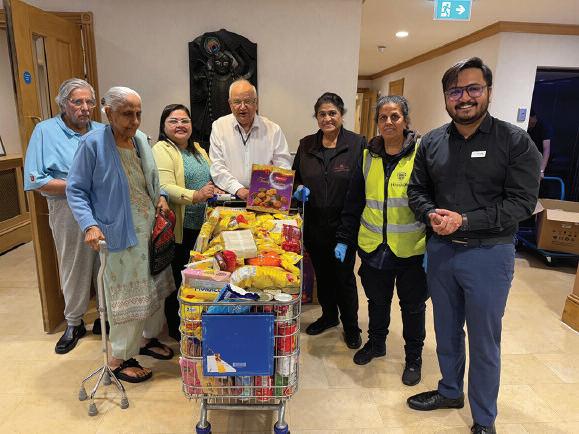
Karuna Manor care home in Harrow recently organized a Navratri Food Donation Drive from October 3rd to October 15th, 2024, in a heartwarming effort to support local communities The drive saw generous contributions from residents relatives and staff members with all donations going to the London Community Kitchen (Harrow Branch) to help those in need The food donation drive was a significant part of Karuna Manor s commitment to fostering community spirit and giving back during the auspicious festival of Navratri a time of reflection prayer and charity The collective efforts resulted in a substantial contribution of non-perishable food items, ensuring that local families and individuals facing food insecurity would receive support The Karuna Manor community came together to make the initiative a resounding success with residents their families and staff members joining hands to contribute a variety of essential food items The donated goods were handed over to the London Community Kitchen whose Harrow branch plays a pivotal role in distributing food to those in need across the borough Mrs SM a resident at Karuna Manor shared her thoughts: Participating in the food donation drive brought me great joy Navratri is a time of giving, and I felt blessed to be part of something that helps people in need It was truly heartwarming to see the entire community coming together for this cause Mr RM another resident also expressed his gratitude: "I’ve always believed in the power of charity especially during religious festivals like Navratri Karuna Manor s food drive gave me a chance to contribute in a meaningful way I’m proud of what we ve achieved as a community and I hope our donations bring relief to many " Payal Chhabra Home Manager of Karuna
As
unique addition provides excellent value and a fully robust training package
SCTV are delighted to have won several awards over the last 12 months including: Best Online Health and Social Care Learning Platform – Global Health & Pharma Social Care Awards 2024 ‘CPD Provider of the Year’ – The CPD Awards Social Care Training
accessible to all and offer regular, free courses which include a digital certificate accessible via their website
The company stands behind a clear mission and set of values which define their ethos and their dedication to both the Care Sector and those within it These can be viewed at: Mission Statement and Core Values - Social Care

National charity Access Social Care has released its annual State of the Nation report which reveals a significant increase in the number of requests for social care advice across nine major advice and helpline organisations The report paints a desperate picture of the current social care system, with the rise in demand for advice far outstripping the available resources
The nationwide data in this year s report showed a 222% increase in the number of enquiries about social care needs assessments compared to pre-pandemic as well as a 206% increase in enquiries that required specialist social care legal advice The report compares data across three-time frames: pre-pandemic 2019-2020; the pandemic year 2021-2022; and finally the post-pandemic year 2023-2024 The report is clear: vast numbers of people continue to struggle with accessing social care support Access Social Care is a charity providing free legal advice for people with social care needs Its fourth annual State of the Nation report is a data collaboration project bringing together anonymised data from Royal Mencap Society Age UK Carers UK Independent Age RNIB Ealing Advice Service Citizens Advice Bureau and Scope The resulting report draws together over 364,000 separate data points and outlines the key challenges facing people who need social care
THE REPORT ALSO REVEALED:
96% more advocacy queries
204% more unpaid carers queries
• 7 times as many mental capacity queries
Kari Gerstheimer, founder and CEO of Access Social Care, said: “The last administration asserted they were adequately funding adult social care whilst civil society estimates there is an annual funding gap of at least £8 4B per year With such a reality gap data collaboration projects like this are vitally important because they allow us to see the real issues experienced by people who need social care
across a range of organisations Year after year this report highlights serious problems experienced by social care advice seekers, and our 2024 report is no exception
In July 2024, the country voted in a new Administration The new Labour Government say they want change so do we There is a real opportunity to make sure people can live their best lives by ensuring they can access the support they need when they need it We hope this report can serve as a springboard to support positive change We are calling for parties across the political spectrum to act now to understand the scale of social care need and to take decisive and immediate action to solve short term and long term pressures on the social care system ”
Hannah Hewish, Legal Manager and data insight lead at Access Social Care and co-author of the State of the Nation report said: These stark figures speak for themselves and highlight the concerning number of challenges facing hundreds of thousands of people trying to access social care in England today Amit Kohli Head of Data at Access Social Care said It is widely acknowledged that the resources available for social care have not risen at the same rate as demand Yet data gathered on this critical issue by local authorities and central government remains inadequate To fully understand the level of both rising demand and existing service provision social care data must improve In response to this issue Access Social Care s State of the Nation report provides a unique insight into the challenges facing millions of people across the country in need of social care This trailblazing research will be shared annually and used as evidence to drive policy change and shine a light on a system in desperate need of reform
The full report can be found on Access Social Care’s website, here: https://www accesscharity org uk/stateofthenation














Sector leaders and organisations have responded to the care Quality Commissions (CQC) state of health care and adult social care in England report which they say builds on the grim picture from last year about the state of the health and social care system with people struggling to access basic health and care services when and where they need them

Vic Rayner, NCF CEO commented:
“This year’s CQC report, like so many others highlights the real impact on people when social care is underfunded and under resourced If the government is serious about a three-fold shift from hospitals to community sickness to prevention and analogue to digital it must invest properly in the community services that people need to live well including adult social care When resourced and organised properly adult social care enables people to live the lives they want supports them to access wider community and health services at an earlier stage and helps them retain their independence for longer in strong communities – this ultimately reduces demand on acute services
”
Investment in the care and support workforce will be critical for this and we again urge the government to adopt the workforce strategy for adult social care facilitated by Skills for Care and developed in collaboration with a wide range of organisations and people with a stake in the future of care services ”
Finally the report makes no reference the sharp focus that there has been on the CQC’s regulatory function itself There is no mention of Dr Dash s review Professor Sir Mike Richard s review of the Single Assessment Framework or the work being undertaken by the Care Provider Alliance to understand the care provider perspective on assessment Clearly a well-functioning regulator and framework for assessment is one of the requirements for a well-organised and resourced health and social care system There is much work to be done to achieve this ”
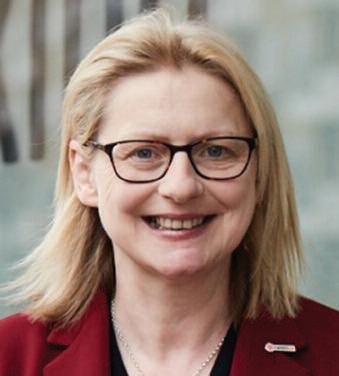
Helen Walker Chief Executive of Carers UK, said:
This report lays bare the intense pressure unpaid carers are under Many of those caring for loved ones family or friends are on the brink, left picking up the pieces in a system where there are extreme shortages in good quality social care
“At the same time the report shows the extent to which unpaid carers are overlooked undervalued and ignored by a disjointed NHS
“This is having a major impact on unpaid carers’ ability to look after themselves with fewer carers now saying they are able to take any breaks to protect their own health and wellbeing Back in the summer, 88% of Directors of Social Services agreed that unpaid carers in their areas were coming forward with higher levels of need in the last year
This is further evidence that this is a growing crisis
“Immediate action is needed to prevent the system collapsing this winter impacting unpaid carers even further

Minesh Patel, Associate Director of Policy & Campaigns at Mind, said: This report brings more appalling news for people with mental health problems and their loved ones Too many are still waiting for far too long to get the help they need in the community, and are getting more unwell while on sometimes year-long waiting lists This means more people are reaching crisis point and if there is a bed free locally, they are detained under an outdated Mental Health Act in hospitals that are often run-down and not fit for purpose
“Inequities in accessing care have taken root too with people in deprived areas women and people from ethnic minority groups with mental health problems more likely to attend A&E Black men s mental health in particular is being impacted – they are more likely to spend longer in hospital and are subject to greater restriction under the outdated Mental Health Act ”
We cannot allow this report which is the latest in a series of devastating revelations about the state of mental health services to just wash over us and for things to carry on as they are The sheer number of people affected by mental health problems means many of us will love or know someone who is struggling, and not getting the properly resourced timely and therapeutic care they need The new UK government has a chance to turn the tide on the nation’s mental health, by prioritising ambitious reforms to the Mental Health Act and capital investment into mental health services at next week’s Budget ”
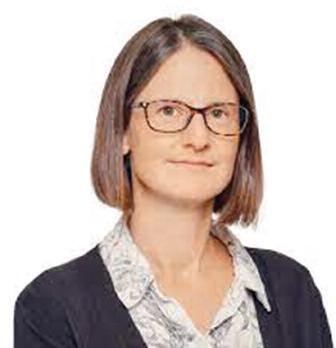
Nuffield Trust Deputy Director of Policy Natasha Curry said:
“The latest CQC State of Care report clearly amplifies persistent stark figures and warnings about failing services and unequal access to health and social care
From social care provision to children and young people’s health services to maternity dementia and dentistry – it shows access and standards of care are just not keeping up with need
“The new government has promised it will succeed where others have failed in bringing reform to social care If they can achieve this it could help hundreds of thousands of people who draw on care carers and staff who work in the sector But we haven’t seen any detail yet on how they will deliver the promised new National Care Service and bring about long term reform or even how they plan to sustain the system in the short term particularly given the worrying state of council finances ”
Meanwhile the health system is constantly at breaking point and we know it does not even have enough funding to keep up with basic day-to-day demand: our new analysis published today shows that the NHS in England is on course to overspend by £4 8bn this financial year ”

Year-on-year we ve seen sticking plaster cash injections fail to heal our ailing health and social care services While longer-term funding settlements are to come next year next week s Budget needs to send a clear message that the government is serious about supporting and improving the long-term health and care of the nation ” Caroline Abrahams, Charity Director at Age UK said: It comes to something when the best we can say about these findings is that they suggest social care hasn’t been further degraded in the last year from its already precarious state However this may be only a temporary reprieve if rumours of further cuts to local government funding in the Budget prove correct and given the sharp reduction in care professionals coming here from abroad
“Too many older people are having to go into hospital and then getting stuck there when medically fit to leave because there s no social care to support them at home It s a vicious circle and one that s causing enormous heartache and distress for our older population – and huge difficulties for the NHS too
“New innovations like community-based falls services, hospital at home teams and local care hubs should all help but the continuing lack of social care especially at home remains a serious problem in many places ” Without enough money or people it s impossible to provide older people with the high-quality support they require to live decently Nothing could better demonstrate the urgent need for the Government to bring forward meaningful social care refinancing and reform ” Director of Policy at the Health Foundation, Hugh Alderwick, said:

Following Lord Darzi s stark diagnosis of the state of the NHS the CQC’s latest State of Care report provides yet more evidence of the scale of challenges facing the new government
“The report points to the pressures right across the health and care system – with too many people going without the care they need unfair differences between areas, and concerns about quality of care for some groups including children and young people
“The new government has emphasised the depth of the crisis that it has inherited Now in power it is their responsibility to fix it The start of a national conversation on a new NHS plan is welcome – as are promises to bring forward a plan for social care But ministers must avoid repeating mistakes of successive governments that promised social care reform then failed to deliver ”
Big ambitions on reform must be accompanied by investment Labour should remember that its last round of reforms responsible for turning around NHS performance in the 2000s did so backed by substantial increases in spending The Chancellor’s first Budget next week is an opportunity to demonstrate their commitment to getting the NHS back on its feet ”
Staff and residents at Hyacinth House Care Home in Stapehill are celebrating because their wonderful resident Gwen Raggett MBE has completed 60 years of voluntary service
A special celebration was held to honour Gwen for her extraordinary 60 years in the Royal Voluntary Service This event attended by local dignitaries including the Mayor of Ferndown Councillor Terry Cordery the Mayor and Mayoress of Wimborne Councillor Jeff Hart and Barbara Hart and Mayor of Bournemouth Councillor George Farquhar was a testament to Gwen’s remarkable dedication Also joining the celebration were members of Gwen s family making the occasion even more meaningful Maria Jacobson Royal Voluntary Service Manager for Dorset and the Home Library Service and Gwen s family approached Hyacinth House about presenting Gwen with her 60-year badge and certificate They wanted to create a memorable event and Hyacinth House embraced the opportunity organising a special lunch to mark the milestone Maria Jacobson, accompanied by David Tozier, RSV Service Assistant for BCP Home Library Service delivered a heartfelt speech reflecting on Gwen s incredible service especially within the Books on Wheels program Gwen’s volunteering journey began in October 1964 with the Women’s Royal Voluntary Service (WRVS) now known as the Royal
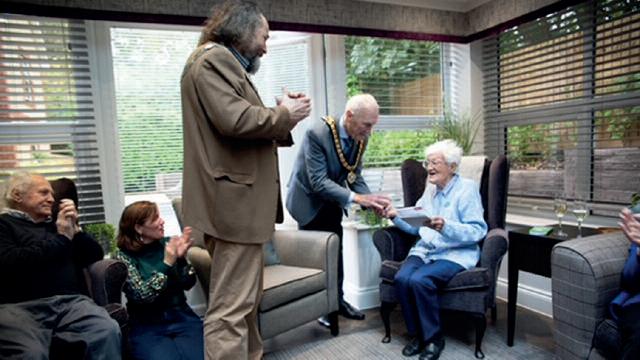


By Sabina Kelly
Ba(Hons)
As the Community Matron of The Chiswick Nursing Centre I have a wealth of experience in the health and social care sector I held positions such as Senior Sister at King Edward VII Hospital for sixteen years Clinical Manager-private patients HomeLink Healthcare Director of Operations Right at Home-Central London Interim Manager of a care home, CEO Nacas National Association of Care and Support Workers and interim CEO True Honour I have a passion for delivery of the highest standards of care in the adult social care sector I have so loved my journey and career pathway and am driven and have the ambition to help others experience the same in order for other people to become trained healthcare professionals as I believe it can be such a satisfactory and rewarding career I also welcome over 50’s to the Sabco Academy of Training in Adult social Care as they can contribute a wealth of life skills and experience and may even discover a whole new career
You can train as a carer in just one module in a specific area of care of complete the nationally recognized care certificate Your training will cover standards of care required to meet the government requirements and will be delivered by highly skilled trainers in the classroom There will also be an opportunity for hands on training and experience with the residents supervised and competencies signed off which will provide evidence of experience when applying for work All of our training is delivered in
partnership with the trainers of The Chiswick Nursing Centre Once you have qualified as a health care assistant you can apply to the Chiswick Nursing Centre for a position All applicants are guaranteed an interview or if you wish to apply elsewhere in the sector or the NHS WHY SOCIAL CARE?
The social care sector is drastically short of carers causing monumental problems for our elderly and vulnerable people that are just not getting the care they need and deserve often resulting in tragic outcomes People have to remain in hospital for longer lengths of stays due to lack of care opportunities and are also waiting on longer lists of waiting time for treatment which impacts heavily on them There is an urgent need to train more cares in the highest standards of care Caring is challenging work but it can bring so much joy and close relationships can be formed and deep sense fulfillment a sense of purpose a feeling of making a difference and a sense of direction in one s own life There are many opportunities for career progression in various different fields on which a career pathway can be chosen which you may like to consider
If you may be interested have a look at the website www sabcoacademyoftraininginadultsocialcare co uk or call me direct on 07976287189
ative and making themed dishes each week throughout the month from Jamaica Africa and South America
Stephanie Tillotson Wellbeing Coordinator at Dove Court Care Home remarked “It has been a great event, especially the African drum history and learning to play Thank you so much to Phil Kaila and Maria O'Sullivan for such an educational and fun event Everyone loved it
Cat Brierley Home Manager at Dove Court Care Home added:

diversity of Black History Month Colleagues at the home shared stories with each other about what it means to them and why it is important to be inclusive Ruby Hedge Care Assistant at Elmwood House Care Home commented: When I first arrived in the UK from the Philippines I found it very different I moved so far from my family and friends and it was hard Working with older people in the UK is different it is a different culture I like it In my culture we are family orientated and we look after our elderly and the community I use that in my working life ” Gill Exton aged 80 a resident at Elmwood House Care Home stated:
It is important to be inclusive because you could be that one that one that is different Be it a disability your mental health your race or your gender ” Residents at Dove Court Care Home in Burnley Lancashire have been embracing October by marking Black History Month with arts and crafts singing music folklore and learning lots of history in the process too
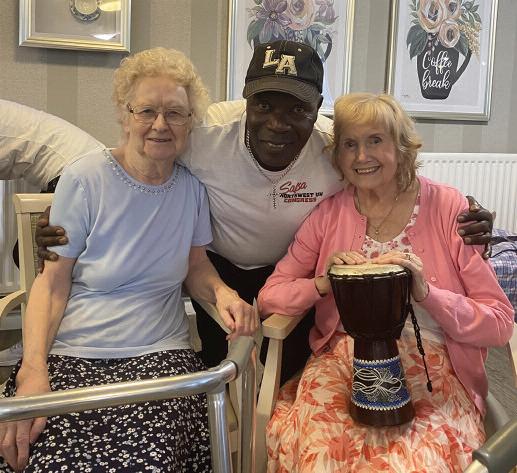
Phil Kaila, who is a World Salsa Champion from Salsa Northwest that provides Salsa events and African drumming experiences, recently visited Dove Court Phil taught everyone at Dove Court about the language of drum playing through using different techniques
Phil discussed the history of African drumming and told many stories about African Folklore Maria O Sullivan also from Salsa Northwest taught residents’ different cultural dances too
Marylin Sutcliffe a resident who lives at Dove Court Care Home, said:
I have thoroughly enjoyed myself at the African drum event and would love to see this again ”

Residents and colleagues also took part in a themed singalong and an arts and crafts session, inspired by the late African American artist Alma Thomas The catering team at the residential nursing and dementia care home have been getting cre-
We thoroughly enjoyed the African drum event that was both educational and entertaining It was wonderful to be involved in something so enriched in culture ”
At Priory Gardens Care Home in Pontefract West Yorkshire, Charles Maduabuchi Ogbuji, Care Assistant has shared with residents and colleagues details about his Igbo heritage and upbringing Charles from the Igbo tribe was born in 1985 in Northern Nigeria Charles family is made up of six sisters and, as the only son, he takes the place as the Opara in his father s absence

Charles attended church service with his parents and siblings and he had a very strict upbringing courtesy of his mum Charles relocated to the UK in 2022 with his wife and his daughter who was born in Bradford and now works at Priory Gardens Care Home
Charles shared his knowledge on the Igbo culture with residents and colleagues, which included their arts music dance language clothing and food
Charles also went on to share details about the traditional lgbo religion which is based on the belief that in a creator God an earth goddess and other deities and spirits
They also believe in reincarnation and that ancestors protect their living descendants Resident and colleagues were particularly interested in hearing about Charles’ stories about Igbo food including Yam which is eaten boiled or pounded with soups Charles went on to tell residents and colleagues that he and his family are particularly fond of Ofe oha omugbu (bitter leaf soup) Ofe akwu (palm carnel soup) and Egwusi (melon soup) which are all popular soups within the Igbo culture
“Residents and colleagues really enjoyed listening to Charles stories and information about the Igbo culture, traditions, customs religion and food It was really interesting and we all learnt a lot!
“Thank you to Charles for taking the time to share details about his culture with us and we look forward to hosting a food tasting session in the near future to try some of the popular Igbo soups Charles mentioned to us
In addition to the countless activities taking place across its care homes HC-One colleagues also marked Black History Month by:
HC-One temporarily changed the desktop wallpaper of colleague s electronic devices and email signatures showing HC-One’s United in Kindness message as well as the company Facebook banner and frame with Pan-African flag colours to mark the occasion
HC-One updated its Equality Diversity and Inclusion page on the company’s internal intranet page OneNet and kept the Viva Engage community updated with awareness pieces and stories from across HC-One
During the first week of Black History Month, HCOne explained what Black History Month is and why it is celebrated During week two, HC-One shared information about the significance of the hair of black women as a symbol of self-expression identity and celebration and about how to care for it During week three HC-One invited a range of diverse colleagues to share their stories
To mark the end of Black History Month HC-One celebrated trailblazers from minority groups in the healthcare sector
A new survey reveals that less than half of the public (42%) trust the Care Quality Commission (CQC)
The results highlight worrying concerns about the organisation’s ability to safeguard people following the Dash Review published last week which found significant failures at the regulator
The survey commissioned by health and social care communications agency PLMR and conducted by Savanta also found that just 44% are confident CQC inspections and reports are accurate
The new statistics have caused concern across the sector with Jonathan Gardner Chief Executive Officer of national home care provider Bluebird Care, suggesting it is “deeply concerning to see that public faith in the CQC has fallen so low ”
Dr Jane Townson Chief Executive Officer of the Homecare Association described the collective evidence as damning and deeply troubling for the care sector
Dr Penny Dash s final report into the operational effectiveness of the CQC which was commissioned by Health Secretary Wes Streeting was released last week The report identified several serious failings at the regulator which she suggested had “led to a substantial loss of credibility within the health and social care sectors”
The CQC s current approach to assessments was found to offer limited information for providers service users or patients as to what care looks like under each of the ratings categories
The review concluded that the CQC s poor performance had impacted its ability to ensure that health and social care services provide people with safe effective and compassionate care ”
The findings come as Kate Terroni, Interim Chief Executive Officer of the CQC, has announced she is leaving the organisation after what she described as “an intensely challenging experience”
2 031 interviews were conducted among the general public as part of the survey targeting a nationally representative UK 18+ audience over the 15th and 16th October 2024

Dr Jane Townson, Chief Executive Officer of the Homecare Association said: “These findings, coupled with the reviews by Dr Penny Dash and Professor Sir Mike Richards, mirror our own research at the Homecare Association The collective evidence is damning and deeply troubling for our sector Effective regulation is essential for maintaining high standards of quality and safety of care It is also vital for fostering public trust in our services
“The fact that less than half of the public trusts the CQC or understands its responsibilities is a serious concern that needs addressing with urgency
“Many of our members have had to implement their own quality assurance measures to fill the gaps left by infrequent or ineffective CQC inspections Others are waiting months for registration
The Homecare Association stands ready to work collaboratively with the CQC to rebuild trust and create a regulatory system that truly serves the interests of those who rely on care and support
Nathan Hollow Group Director and Head of Health and Social Care at PLMR who commissioned the poll commented “In my work with clients, I’ve seen first-hand how much we need to battle against an ineffective CQC that is unwilling to engage even to the most serious of allegations This undermines confidence and heaps pressure on a healthcare system that is under severe strain
The road to rebuilding this trust will be long and complex Our polling shows trust is lowest amongst those groups which rely on healthcare services the most – older people and those from lower socioeconomic backgrounds
“Alongside addressing its many operational challenges, the CQC needs to look carefully at how it communicates its findings to the public makes this information easy to understand and ensures its reports are accessible to all It s currently failing on these basics and fundamentally letting down the public and those vulnerable people in need of high-quality health and care services
The Mallard Court care home in Bridlington was full of animal mischief and swashbuckling fun as we welcomed some very special feathery guests courtesy of ‘Parrots and Pirates Residents at Mallard Court were pleasantly surprised to see their new feathered friends awaiting them in our homes lounge area against a pirate themed backdrop!
Inca Mishka and Aurora Three beautiful parrots were on hand to happily meet and greet our residents and enjoyed receiving bird treats from them
General Manager Ange Dooley-Widds said: “Our residents have really enjoyed their unusual visitors today We knew that having the pirates and parrots here would be a bit of fun for all our residents, we are always looking for new activities for the residents and today we have seen the seen the enjoyment and the therapeutic influence animals can have on people ” Resident Betty was very excited by the Parrots As a child I used to love reading all about tropical birds and looking at photos of them Today was a real treat and very enjoyable ”

Responding to the launch of the consultation for the Government’s 10 Year Health Plan BMA council chair Professor Philip Banfield said: “The BMA as the trade union and professional association for doctors and medical students, has always been willing to have frank conversations with Government about the reality of the front line working in our health systems and what is needed for positive reform for doctors, for patients and for the health of the country
“We will gladly take this invitation to continue engaging with the Government on behalf of all our members – whether they are working in general practice hospitals public health universities or elsewhere – and the patients we care for ”
We will naturally be considering our response carefully and submitting it in due course – but it is vital that amid any changes, the voice of doctors and their colleagues is not lost and that Mr Streeting sticks to his word that ‘the best ideas won’t come from politicians in Whitehall’ but from staff ” Front and centre we cannot be clearer: we need investment now especially as we approach winter and not wait for another review that concludes the obvious about the under-resourcing of public health and healthcare in the UK ” Several questions arise from the policies floated in today s announcement There is no doubt that prevention is better than cure, and ensuring people can be seen earlier, outside of hospital, benefits the whole system – easing pressures and saving money But it s very unclear how neighbourhood health centres would be run, by whom and how they would be paid for GP practices already provide invaluable continuity of care in people s communities proven to reduce poor health outcomes and hospital admissions with family doctors working with a wide range of healthcare professionals It is not the model that is broken but lack

of investment to keep practices’ heads above water and help GPs and their teams meet patients’ needs that is holding them back ”#
The idea of a digital patient passport may sound convenient in principle, and doctors are as frustrated by IT systems that do not talk to each other as their patients are surprised by it But discussions and choices around patient data need to involve cast-iron safeguards and ensure they do not exclude those who are not digitally engaged or literate “Likewise we have to be realistic about the potential of things like wearable tech as a prevention tool and who will benefit from this – and those who will be left behind “In terms of technology, we cannot underemphasise the need to get the basics right first Millions of hours are wasted each year due to faulty and outdated computer systems – whether this is waiting half an hour to log on to a constantly crashing computer or having to share one ancient PC that is wheeled around a ward ”
An over-reliance



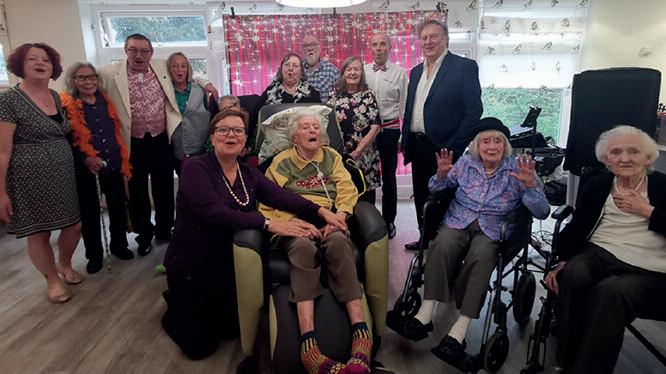

For many of us a trip to the hairdresser is more than just about getting a haircut; it s a chance to chat relax and feel pampered For the residents of Aria Court in March that experience is brought to life by Pat Betts, who has been visiting the care home as their trusted hairdresser for an incredible 30 years
At 70 years young, Pat has no plans to hang up her scissors “I still love coming into Aria Court she says with a warm smile It s such a lovely family atmosphere and the work is so rewarding ”
Pat’s journey as a hairdresser began back in the 1970s when perms and shampoo-and-set styles were all the rage After finishing school she attended college in Wisbech and started out working in a salon “It used to be all about rollers and those big hairdryers on stands she laughs Things have certainly changed since then!”
In the late 70s and early 80s Pat made the move to mobile hairdressing a new concept at the time It turned out to be a perfect fit, especially as she balanced her career with raising a family Living locally she was able to run a busy schedule often having clients visit her home She also inspired two of her daughters to follow in her footsteps having grown up watching their mum work her magic with scissors and a comb
Over the years, Pat has worked in several care homes across the area, but she has a special place in her heart for Aria Court and for the past three decades she has been a familiar face in the care home, currently working there three mornings a week
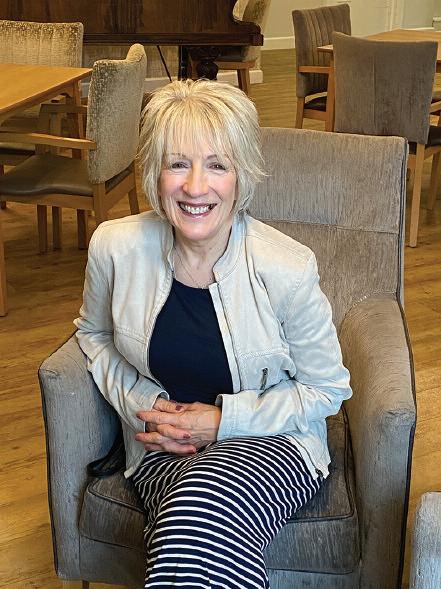
For Pat hairdressing at Aria Court isn’t just about making sure everyone looks their best; it’s about connecting with the residents and hearing their stories “It s a social experience for them ” she says “They love to chat while getting their hair done There s one lady who always talks about her love of Tom Jones and all the concerts she went to when she was younger ” Every week around 30 residents both men and women come to see Pat and she loves every moment of it “People enjoy getting their hair done It gives them a real boost,” she explains “There’s nothing quite like seeing the smiles on their faces when they look in the mirror It s lovely to see
For many residents a visit to the salon feels like a trip out complete with a chat a cup of tea and maybe even a puzzle book or magazine to pass the time Pat makes sure to create that comfortable, salon-like atmosphere, helping residents feel pampered and cared for It s like a little outing she says They can relax and feel like themselves again ” Over the years Pat has built strong relationships with many of the residents at Aria Court some of whom she has been seeing for years In fact she’s even come across a few familiar faces people she used to style back when they lived in their own homes in the March area One lady was one of my first clients when I was just 18 or 19,” she recalls Some of her most cherished memories are the moments when her work makes a real difference “I remember one lady who had been poorly and
A social care service in Dundee which supports two men with severe learning disabilities has been shortlisted for a national award in recognition of the life-changing care provided Lindsay House part of the Cygnet Social Care division in Dundee has been nominated in the Specialist Service of the Year category at this year’s Scottish Care Home Awards
Scottish Care will be hosting the 20th consecutive National Care Home Awards on Friday 15 November at the Hilton Hotel Glasgow The event honours excellence in Scotland s independent care home sector The Specialist Service of the Year will be awarded to individuals and teams who go above and beyond to provide high-quality care and support to residents Lindsay House Manager Anna-Marie Bean (Annie) explained: “I am absolutely over the moon that the service has been shortlisted for an award We have the privilege here of supporting two young men within Lindsay House and seeing them every day and the difference the dedicated team make is reward enough for the job that we do
“It is completely overwhelming that we have been recognised in this way Everybody at Cygnet Social Care is delighted
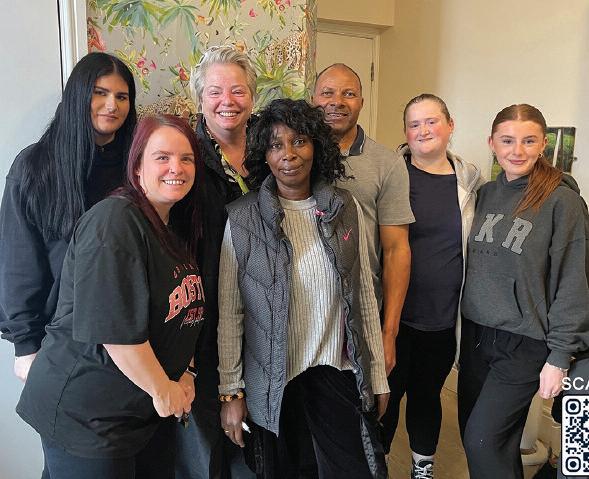
The two apartments at Lindsay House each have their own front door, lounge and personalised en-suite bedroom as well as a kitchen to support learning independent living skills and a shared private garden The residents are supported to access community amenities, including leisure centres, social clubs, shops,
for him to return to due to his
challenging behaviours
He is nonverbal and had very little communication skills and understanding when he first arrived As a result of the team’s hard work and dedication to their roles he is now able to verbalise some of his needs and uses clear communication strategies He is
the care at Lindsay House Annie said: One of the things that makes Lindsay House work well for both residents is that there is genuine care and compassion between the staff team and the men that we support For example when you walk into one of their flats after a few days off and one of the residents says “I’ve missed you”, it makes you feel like he is safe and happy and that he reciprocates that care and trust in you
“When they see you and their faces just light up and the smile they give you has the most warmth and expressive emotion behind it it completely brightens up your day
“With our residents being nonverbal the expressive emotion means so much more
“We are proud to celebrate the progress and achievements that both of our residents have made over the years and the team are extremely proud to be part of their journey
The Royal College of Nursing (RCN) is warning that entire regions in England are being left behind by a failing nurse education system as our new analysis reveals that the number of people studying to become nurses has collapsed in every region in England This is putting the government s plan to rescue the NHS at risk
The latest regional data from the university admissions service UCAS shows the number of people accepted onto nursing courses fell by up to 40% in parts of England between 2020 and 2023

This comes just one week after the government launched its 10-Year Plan consultation to fix a broken NHS” A properly staffed NHS is crucial to delivering the government s own ambitions to get NHS services back on track shifting care from hospital to community
We re urging the government to introduce financial incentives, including a loan forgiveness model for students who commit to working in the NHS following graduation and funding for living costs This is vital to improve recruitment into the profession Changes made in 2016 saw bursaries for nurse education scrapped meaning students now pay more than £9 000 each year to join the profession Nursing students need specific funding commitments to reflect their unique circumstances and to encourage more domestic recruitment They com-
We desperately need more people to join the profession, but the reality is nursing numbers are going in the wrong direction
“Ministers are right to want to modernise the NHS and shift care into the community but to do that you must make nursing an attractive career once again That means forgiving the tuition fee loans of those who commit to working in the health service and funding their living costs Investment in nursing is always money well spent

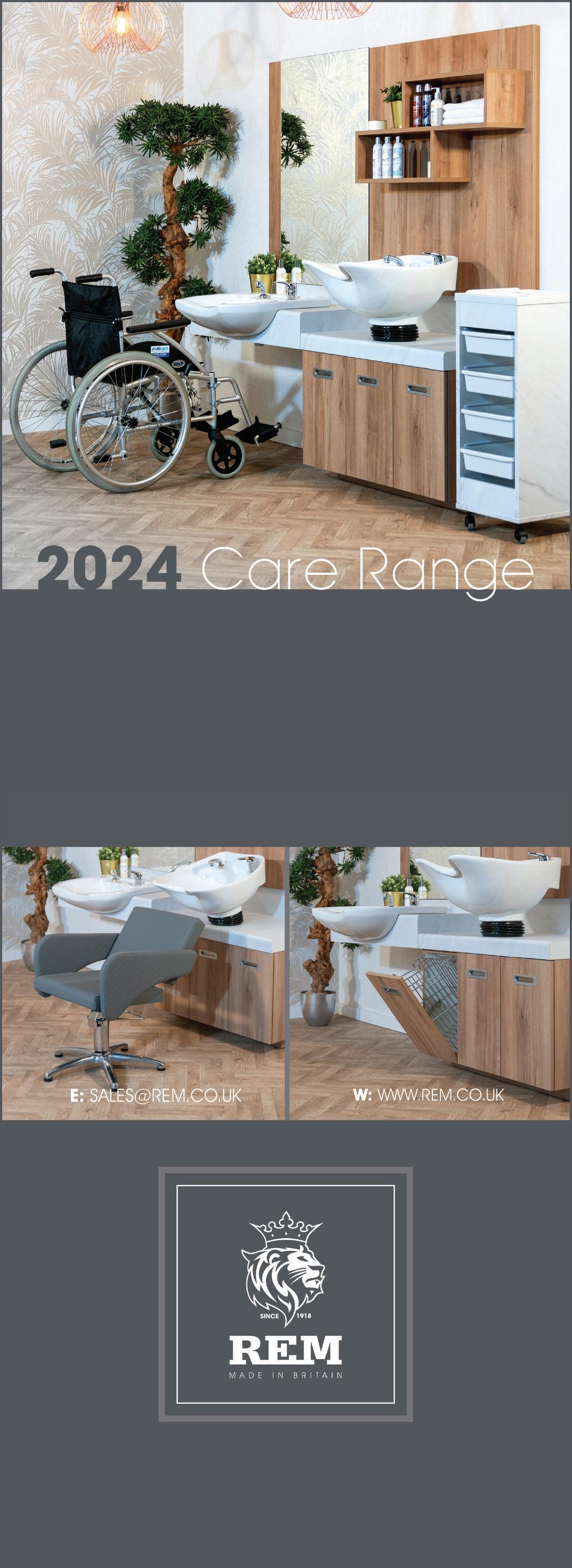
REM have been manufacturing furniture for the Hair & Beauty Sector for over 100 years and are now considered to be one of the largest manufacturers in both the UK & Europe Understanding the growing requirement for Care & Residential Home Salons, REM’s Design Team have produced the Pendle Care Range for the Small, Compact Care Home Salon

Every three minutes someone develops dementia in the UK It is the leading cause of death in the UK But more often than not when a person is diagnosed with dementia they are left to cope alone with little to no support with unanswered questions about what to do next and what their new future looks like
Next month Dementia UK will be launching its free online series ‘Dementia what next? to help people and families impacted by dementia to learn more about the condition and the next steps they can take after receiving a diagnosis
Hosted by the charity’s dementia specialistAdmiral Nurses the sessions – which will take place over Zoom - will provide expert information and advice on topics frequently asked about, to help people navigate the future with more confidence
The first session of the three-part series will take place on 1st November and will cover What is dementia? Ahead of this the charity has shared helpful tips and information on commonly asked questions about the condition WHAT ARE THE COMMON TYPES OF DEMENTIA AND THEIR SYMPTOMS?
Dementia is an umbrella term for a range of conditions affecting the brain where symptoms gradually progress over time There are over 200 different types of dementia – all of which can present in varying ways and can be challenging to detect in the early stages but three of the most common types are
ALZHEIMER'S DISEASE
Alzheimer’s disease is the most common form of dementia It is caused by a build-up of proteins in the brain which affect how the brain cells transmit messages Symptoms of Alzheimer s are usually mild at
the beginning and gradually worsen over time People can experience issues with memory concentration and speech; this can all culminate in the person withdrawing from social and family circles VASCULAR DEMENTIA
Vascular dementia is the second most common type of dementia after Alzheimer’s disease Itis a form of dementia that occurs when the brain does not receive enough blood supply meaning it cannot carry out its normal functions It can cause problems with concentration thinking and carrying out daily activities The early symptoms of vascular dementia also differ from some other types – for example changes in mood, behaviour and personality are initially more common than memory problems
LEWY BODY DEMENTIA
Lewy body dementia is a progressive complex and challenging subtype which is thought to account for 10- 15% of all those with dementia and includes two subtypes; dementia with Lewy bodies andParkinson s It is caused by abnormal clumps of protein (called Lewy bodies) gathering inside brain cells These Lewy bodies can build up in many parts of the brain but particularly in the areas responsible for thought, movement visual perception and regulating sleep and alertness Around 10% of youngerpeople with dementia have dementia with Lewy bodies HOW CAN A PERSON WHO IS LIVING WITH A DIAGNOSIS OR CARING FOR SOMEONE WITH IT TAKE CARE OF THEIR WELLBEING?
Caring for a loved one with dementia can be exhausting Taking care of yourself often falls down the list but looking after your wellbeing is important This includes paying attention to your own physical and health needs, continuing regular health check-ups and visiting your GP when you are concerned as well as keeping physically and mentally
active It is also helpful to lean into your wider network and nurture your other relationships This can provide opportunities to talk to other people about what you re going through and allow them to support you as well as giving you vital time out to enjoy each other s company For a person who has been diagnosed with dementia, they may be struggling to come to terms with what their future looks like and may find that they are isolating themselves due to lack of confidence or fear of judgement It can be helpful to speak to someone you trust about how you are feeling and share with them some activities that you enjoy making plans to do them together It’s also beneficial to look at local community groups and dementia café s so you can connect with other people who understand IS THERE ANY MEDICATION FOR DEMENTIA?
Currently there is no cure for dementia However for certain types of dementia medication may help to relieve some of the symptoms or slow its progression Medication can help with everything from anxiety to concentration to memory and motivation However some medications are not suitable for all forms of dementia and not everyone can tolerate medication particularly if they have pre-existing health conditions so it is important to visit your GP if you or someone you care for is living with dementia and would like to consider options for medication For more information or to register for the ‘Dementia: what next?’ programme visit: www dementiauk org/dementia-what-next
The first session ‘What is dementia? takes place on Friday 1st November 2024 from 10 – 11:30am via Zoom
Alternatively if you need advice or support on living with dementia contact Dementia UK s Admiral Nurse Dementia Helpline on 0800 888 6678 or email helpline@dementiauk org
A former singer who is now a resident at HC-One s Capwell Grange, in Luton, Bedfordshire, has set her sights to inspire young singers after an illustrious music career crossing paths with music icons such as David Bowie and Sir Paul McCartney Samantha Tims 73 began her star-studded career at the age of just 16 performing at local London folk clubs in the early 1950s Born as Christine Timbs in Holloway North London, Samantha’s love for music emerged naturally and her hard work soon paid off when she received her big break in the industry after being identified by BBC TV for the show Give Us A Song in 1969 where she recorded ten programs In 1970 Samantha performed aboard the Queen Elizabeth II traveling to the United States which was a prestigious achievement for young artists Samantha continued to tour abroad, where she performed in Germany Cyprus Malta and even The Persian Gulf to entertain British Forces

However it would be a chance encounter that would shape the course of Samantha s career While visiting her aunt in Corby, Samantha met songwriter Eddie Seago, who by chance was searching for an artist to record one of his songs a chance that Samantha would jump at This serendipitous meeting led to the recording of Johnny Rebel marking the beginning of her professional ascent
Describing it as a “fairy tale” moment “Johnny Rebel” Samantha’s first major hit was released by Pye Records in the autumn of 1971 The song was a breakthrough hit for the singer as she sold around 10 000 copies and helped establish her career in the music industry
With further releases and collaborations such as Cry Wolf and Only Yesterday Samantha also partook in a career in television with a show titled “The Sound of Sammy Tims” which was later broadcast on
Yorkshire TV and Westward TV in 1972
As part of her illustrious career, she crossed paths with music stars such as Paul McCartney David Bowie Davies Twiggy Mary Hopkin Freddie Davis Mungo Jerry and Clodagh Rodgers From singing in local clubs to performing internationally and working alongside some of the greatest names in music
Samantha built a career that spanned decades
Following her success in the music industry Samantha is determined to pass on her wisdom to young up-and-coming musicians believing that persistence self-teaching and seizing opportunities are key when trying to make a name in the music industry Samantha said: It took a combination of talent perseverance and a little bit of luck to get into the music industry Young up and coming musicians should remember the importance of seizing opportunities when they arise ” You should be prepared for the unexpected practice your craft remain open to new possibilities and don’t be discouraged by setbacks Success in music is as much about timing and persistence as it is about raw talent – be who you are
Monika Czerwinska Wellbeing Coordinator at HC-One’s Capwell Grange stated “It feels absolutely amazing to have such
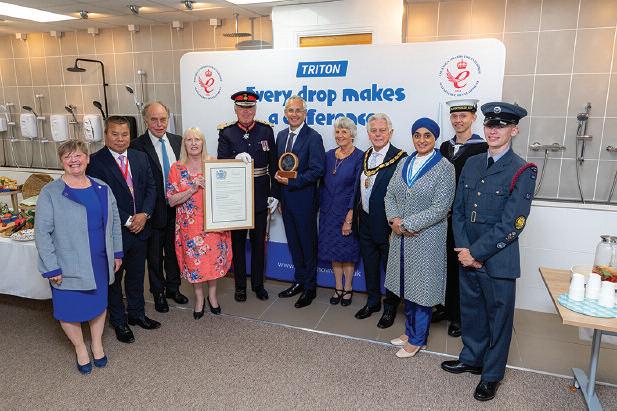







Creating environments that support the wellbeing of individuals living with dementia requires thoughtful design and the right choice of colours Here, Dawn Scott, Senior Colour Designer at Dulux Trade, explains how colour can enhance care home settings by fostering a soothing and positive atmosphere.

To ensure care home residents are at ease and comfortable, it is vital that spaces feel homely and promote positivity and healing This can be achieved through design and selecting colours like the Dulux Colour of the Year for 2025, True Joy™, that offer uplifting qualities that are ideal for such settings True Joy™ can also be paired with tones from the accompanying Bold and Human colour stories to create standout schemes suited to every area of a care home:

become ‘washed out’, making it difficult to distinguish between different shades As a result, it is recommended to use contrasting colours across critical surfaces such as doors, walls, and ceilings to make it easier for people to move through a space For example True Joy™ is a saturated colour and would work especially well on a feature wall
To ensure the best results, Building Regulations Approved Document M vol 2 and British Code of Practice: BS83002:2018 - which can help to meet the Equality Act 2010say that critical surfaces must have a minimum visual contrast of 30 Light Reflectance Value (LRV) points LRV measures the percentage of visible and usable light reflected from a surface when illuminated by a light source
For example, painting doors and door frames in a different colour from the surrounding walls makes them easier to locate If you were to use Sapphire Salute on a door, you could use Sweet Embrace or Coarse Seashell on the walls, as these meet the minimum visual contrast of 30 Light Reflectance Value (LRV) points
Bold Colour Story: Inspired by the thrill of adventure, these bold colours bring spontaneity and energy to any space The colours in the Bold palette are a great choice in activity rooms and staff areas, as they can help to boost morale and energy and create a sense of positivity
Human Colour Story: Celebrating artisanal craftsmanship, these shades are inspired by raw materials used in handmade processes, including wood and clay The cooler tones found in this palette are ideal for bedrooms and staff areas as they evoke a sense of calm and comfort Pairing these colours with the positivity of True Joy™ creates a sense of calm optimism, helping residents, visitors, and staff feel more at ease
As well as colour choice, it is also important to think about placement Everyone uses colour to help with navigation and wayfinding, but this is especially important when designing spaces for aged living As we age, colours can

To help find suitable colours, Dulux Trade has named its shades using a notation system that includes the LRV of every colour For example, the Dulux Colour of the Year, True Joy™ has the following colour notation: 40YY 49/546 The first four letters and numbers refer to the colour hue, the next two numbers refer to the LRV and the final three digitals are the chroma (which is what makes a colour either intense or subtle, so the higher the number, the more intense it will be)

In conclusion, when redecorating care homes, it is essential to consider the colours used and their placement to aid wayfinding and independence True Joy™ and the Colour of the Year Specifier guide offer a comprehensive information on how to create environments that enhance the well-being of those living with dementia
For more information about True Joy™ and how Dulux Trade can support colour decisions in your care home, visit: duluxtrade.co.uk/cf25 and follow #CF25 on social media
it on tour across care homes in Liverpool Knowsley Sefton and Wirral this Christmas
The show builds on the legacy of Eurovision 2023, following on from Songs for Europe which was commissioned by Culture Liverpool and supported by The National Lottery Heritage Fund as part of the host city s EuroStreet programme
Spurred on by the success of Songs for Europe Peter applied for Arts Council England funding to establish a 10-week theatre company-in-residence in a care home and create a new show and was awarded £45 565 through its National Lottery Project Grants programme

Producer Peter Ward, whose work is inspired by his partner who moved into a care home during the pandemic said The company-in-residence programme will take workshops into 10 care homes in Merseyside Through storytelling, the residents will be encouraged to share their memories of Christmases gone by as well as their hopes for the new year Their memories will inform the content of the show and their voices will be used as the narrative
“From their favourite carols they used to sing in church to treasured toys they received as gifts from Father Christmas we hope to rekindle a bit of Christmas magic The result will be Winter Wonderland an uplifting and moving show which will spread joy and goodwill to care homes in the region ” Emma Hayes Manager at Green Heys Care Home which will be hosting the residency added: We welcomed Songs for Europe as part of Culture Liverpool’s Eurovision 2023 EuroStreet programme, which was a massive hit with our residents So when Peter approached us to ask if we could host a theatre company-inresidence to help create the next production we jumped at the chance
“Reminiscing – whether that’s about past Eurovision Song Contest acts or Christmases gone by – has such a positive effect on our residents improving their mood and making them feel confident and capable again The project is being welcomed by Parkinson’s UK whose Corporate Partnerships Officer Clare Walsh said Taking part in creative activities such as theatre can help people with Parkinson s improve their quality of life by helping them relax and focus their minds We know that singing can have major wellbeing benefits
and helps to improve speech difficulties encouraging people to express to their emotions in a positive way and boosting their confidence too
As well as supporting older people the project is helping younger people gain experience in the creative industry by offering with two work placements to Royal Birmingham Conservatoire students as well as providing a post for an emerging community theatre artist, a recent graduate from the conservatoire The company-in-residence model will also be the subject of a research project by two Faculty of Health & Applied Care PhD students from Liverpool John Moores University Jen Cleary Director North Arts Council England said: “We know that taking part in cultural activities can make a huge difference to how people feel and have a positive effect on their lives so I m delighted that we are supporting Winter Wonderland to 30 care homes across Merseyside over the Christmas period I m sure that the artists and students taking part in the tour will benefit as much as the residents from the show and it’s great to see this activity following on from the Songs for Europe and building on the legacy of Eurovision 2023
Producer Peter Ward explains how his work is inspired by the deteriorating health of his long-term partner Graeme Phillips renowned for his role as Artistic Director of Unity Theatre in Liverpool for 33 years
“Following an acceleration of Parkinson’s Disease and Lewy Body Dementia symptoms Graeme moved into a care home in 2020 during the height of the pandemic
He was convinced he was living in a theatre school and all the carers were actors so I wanted to use theatre as a meaningful therapeutic engagement device for him and hundreds of other people living with dementia
“Earlier this year, I supported him to return to Unity Theatre in a directorial capacity to revive Krapp’s Last Tape The play has held a special place in his heart since he first came across it as a young boy and it was the last production he put on at Unity 10 years ago before he retired
“It was such an emotional experience When he was rehearsing he was completely focused The disease seemed to evaporate Not once did he hallucinate he was completely focused It was staggering for the carers to see him like that ”
He added: The reason behind the name of the theatre company is wherever we go the care home residents can’t remember who we are, they just say “that theatre group” so the name stuck ”
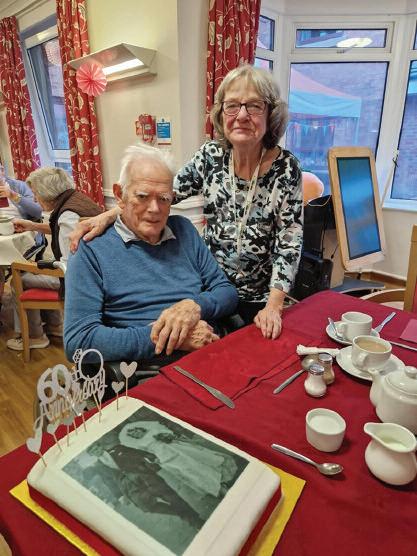
Care provider Parklands Care Homes is to launch new charity partnerships to strengthen its support for good causes across the north and north-east Parklands - which last month won the Highland Business Award for Community Engagement by a Business – is inviting local charities to apply for a partnership starting in 2025 with the potential for a longer-term collaboration
The care provider plans to work with two charities - one in the Highlands and another in Moray and Aberdeenshire However employees will have the option to choose a single charity for all locations, if preferred Eligible charities must either be locally registered or have a significant presence in the area and the final selection will be made by Parklands staff
During the partnership Parklands will focus its fundraising activities within its care homes to support the chosen charities and create volunteering and mentor-

The charity partnership aims to create more meaningful long-term connections with selected charities with a potential two-year partnership on offer Ron Taylor managing director of Parklands Care Homes said We ve always been committed to helping local causes and this partnership gives us the chance to take that support even further with the backing of our team


award!”
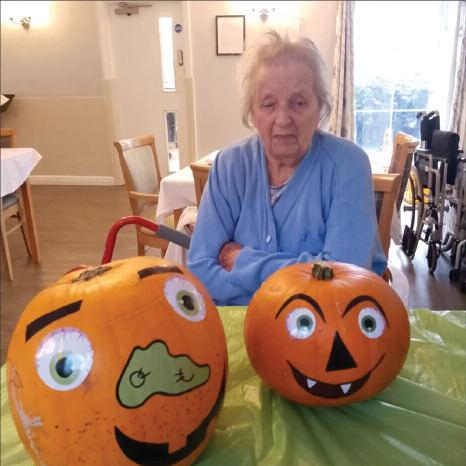


The Halloween party at Persley Castle was one of many themed activities organised by Renaissance Care to promote well-being social engagement and a sense of community among residents proving once again that age is no barrier to a bit of Halloween hocus pocus As Halloween approaches the residents and staff at Barchester’s Paternoster House care home in Waltham Abbey have been exploring the joy that pumpkin-carving can bring particularly for those living with dementia
Calving pumpkins is a great Halloween tradition for residents to get involved in, and today our residents loved working with the care teams across all four communities to design carve and pimp their pumpkins!
We know that partaking in activities that stimulate the senses is a great way to encourage reminiscence and the sharing of stories Our residents and staff had a wonderful time reliving special moments from their past; fond memories of carving pumpkins, from being children
themselves to carving and celebrating Halloween with their loved ones throughout the years General Manager Corina Popesu said “Our staff and residents love any excuse to get crafty and carving the pumpkins today as part of a whole home competition gave them a licence to get creative and potentially win! They all had a tremendous fun digging out the squashes before drawing and carving each design adding googly eyes arms, legs and even tongues to make a Paternoster Posse of characters It was treats all round for the Meadowlands community as Corina and today s Birthday Boy resident; Robert chose the overall winner as the Meadow-Monster!
There's more fun in store for all ages on Thursday 31st October when Paternoster House host their Community Halloween party

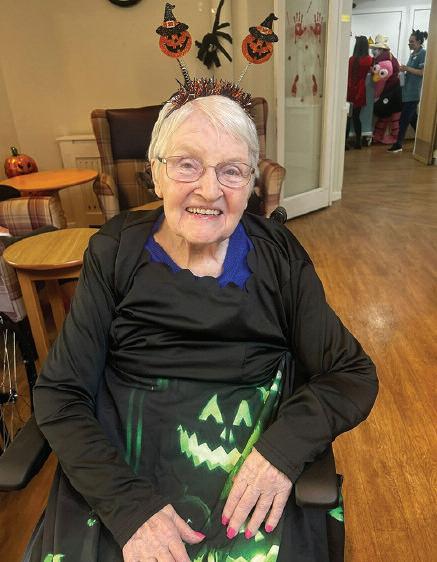
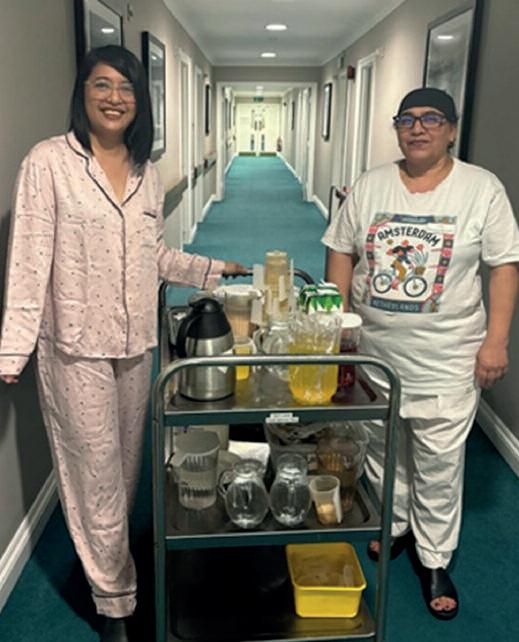
Longueville court care home in Peterborough trialled a pilot scheme involving overnight care staff wearing their pyjamas instead of the usual uniform in an effort to help disorientated residents who struggle to recognise whether it is night or day
This trial would differentiate night staff from day staff, acting as a cue to remind residents that it was night and was successful with psychological and physical benefits observed in residents This included improved sleep at night and reduced restlessness and pacing in residents
Staff also reported that residents’ daytime routine was improved; with increased energy fluid and food intake and reduced mood swings
OBJECTIVES
To ensure the health safety and well-being of residents and staff
• To ensure that staff wear clothing in line with the objective of this case study
• To enable staff to maintain a positive professional image
To enable easy identification and recognition of role and profession
To ensure that infection control and health and safety issues are addressed
Recognising whether it is night or day can be confusing for care home residents with dementia particular-
when
staff in the home wear the same clothes at all hours This can cause disruptions to daily rou-
and improve their night-time routines night staff at Longueville Court have been wearing their pyjamas to work instead of the usual uniforms
The residents initial reaction to staff in their pyjamas was positive, with smiles and chatting about their outfits Residents felt comfortable and relaxed about the walk to their bedroom or wheelchairs to be taken to bed Residents seemed to associate the staff being in their pyjamas with going to bed and were a lot more forthcoming and willing to go to bed than when staff wore their usual attire
For the more restless residents the uniform change had a positive effect in promoting sleep at night reducing sleep deprivation disorientation and pacing These were a regular occurrence for some residents previously which resulted in lack of energy irritability and mood swings
This would then affect their food and fluid intake the next day due to residents feeling exhausted from lack of sleep Longueville Court staff have reported a remarkable improvement in these areas
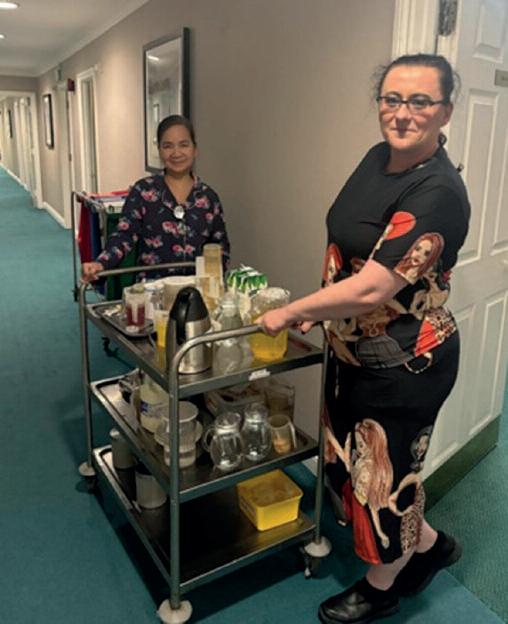
General Manager Krzysztof Krzyszotofiak said: it was very important for
have our dementia community and I am always looking for ways
pilot have been a wonderful success Our team
enrich the lives of our residents
New CHSA campaign designed to inform buyers and end users of cleaning chemicals of the value of regulations
The Cleaning & Hygiene Suppliers Association has launched a campaign designed to spread the word about the importance of regulations when buying cleaning and hygiene chemicals
Compliance with formal UK Government European Union and industry-standard regulations is essential if buyers are to be certain product claims are legitimate and proven Adherence to regulations guarantee safety They underpin transparency and ensure consistency They support buyers informed decision making by providing a framework for comparison so a buyer really knows if they are getting the product or solution they need They also provide accountability giving buyers a route to recourse if needed In short they underwrite an ethical approach
Buyers and end users can also turn to regulations to be certain they are not misled by environmental claims in the rush toward sustainable solutions
Lorcan Mekitarian Chair of the Cleaning & Hygiene Suppliers Association said: Buyers and end users need to be able to trust the product and sales and marketing claims They need to be certain of the balance between efficacy and sustainability and they need to make sure they are using the right product for the job in hand They are not chemists however so may be misled by seductive sales and marketing messaging

“Our advice is to talk to your manufacturer and ask for evidence to support their claims This will come in the form of their technical data sheets, third party verifications and certifications and, importantly, proof of regulatory compliance ” Gobble-de-gook or undefined phrases to be wary of include: ‘non-renewable chemicals’ ‘chemical-free’ ‘natural’ ‘five times filtered water’ and ‘non-toxic’ ‘Biodegradable’ is also a confusing term As applied to cleaning products it is defined in current legislation (Detergent Regulation (EC) No 648/2004 and corresponding UK post Brexit legislation)
Something claiming to be organic should be certified by for example the Soil Association Net-zero claims should be based on the international net-zero standard (https://sciencebasedtargets org/net-zero) or another reliable third party verified certification
Every member of the CHSA has signed our rigorous Code of Practice, which demands our members trade ethically Amongst other stipulations it requires members to: conduct business dealings in an open honest fair and proper manner and in accordance with the laws rules and regulations of the UK and EU ensure all public statements made by and on behalf of the Member are decent honest and truthful ensure no false or exaggerated claims are made verbally in literature electronically or in any other way • hold and provide evidence on request for product and service claims particularly with reference to legislation certifications and accreditations
The CHSA Code of Practice also includes the Competition & Market’s Authority’s Green Claims Code Its principles are summarised as: Claims must be truthful and accurate
Claims must be clear and unambiguous
Claims must not omit or hide important relevant information
Comparisons must be fair and meaningful
Claims must consider the full life cycle of the product or service
Claims must be substantiated
Finally every member of the CHSA s Accreditation Scheme for manufacturers of cleaning chemicals has signed the CHSA s own ethical marketing code
@CHSACleaning www




mk-hire co uk See the advert on page 19

MOWOOT II – proven solution to chronic constipation without medication
Developed by a team of doctors and other healthcare professionals, MOWOOT II performs gentle abdominal massage to speed up intestinal passage in people experiencing chronic constipation
Clinically proven safe and effective relaxing and sideeffects free MOWOOT II
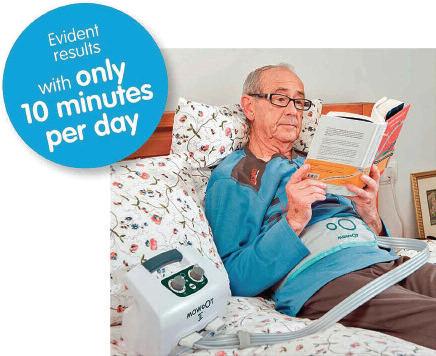
Abdominal Massage Therapy System combats constipation and provides soothing relief to affected people
Easy to use and comfortable the MOWOOT II treats and manages constipation in people with spinal cord injuries multiple sclerosis sufferers Parkinson’s Disease patients and people with constipation related to prescription medication MOWOOT II also helps to relieve idiopathic constipation experienced by menopausal and post-menopausal women

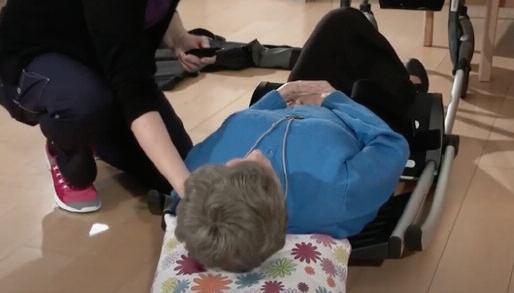
and older and elderly people In clinical studies
MOWOOT II increased evacuation frequency softened stools, improved regularity, reduced gasses relieved bloating and eased off abdominal discomfort 10 to 20 minutes daily of relaxing abdominal massage with MOWOOT II rapidly reduces symptoms of constipation Evident results are experienced only a few days after the first treatment Regular abdominal massage with MOOWOOT II ensures lasting health benefits and better quality of life
MOWOOT II – effective solution to chronic constipation for better quality of life! Supplied



Our Integrity Static Cushions crafted with high-quality materials and innovative design are effective in preventing and managing pressure ulcers by redistributing pressure and minimising skin damage They feature a larger surface area that spreads the user's weight reducing pressure on specific points EasyGo patient lift and transfer chair addresses common issues found in traditional hoists which are often cumbersome and difficult to manoeuvre especially in tight spaces and require multiple staff members EasyGo simplifies the lifting and transferring process enhancing patient dignity and comfort It is designed to move between beds wheelchairs toilets and cars Additionally we have developed a patient transfer seat that can incorporate any Integrity Static Cushion providing optimal pressure relief during transfers

Pressure ulcers are largely preventable with the right approach Our goal is to make your job easier, allowing you to focus on exceptional care and improving residents' quality of life We offer comprehensive product training and support including inperson and online sessions detailed manuals quick-start guides and access to our support team for advice and updates on best practices in pressure ulcer prevention 01457 890 980 | sales@sumed co uk | www sumedinternational com See the advert on the back cover for further information
service

as well as curtains and offers a comprehensive range of shutters
Doug says: “We stock two ranges of silent gliss corded curtain tracks and two ranges of silent gliss uncorded curtain tracks the fitted prices for which are available on this website All of the aluminium silent gliss tracks stock can be shaped and fitted into bay windows, as can some of the poles We also have ready access to many more ranges of both tracks and poles, most of which we can get in one working day “To read more of what our customers say about us please do look us up on Checkatrade checkatrade com/mrtrax
Call now to speak to one of our team on 0800 3345114 or 07968 242004 email us at doug@mrtrax co uk or see the advert on page 8

NCCO International announces the launch of Task Manager an innovative food safety task management and temperature monitoring solution designed for the senior living and residential care home sector Task Manager addresses critical pain points in food safety compliance operational efficiency and resident satisfaction
Task Manager is a game-changer for the senior living industry said Karl Rose Managing Director of NCCO International, "Our system not only ensures compliance with food safety regulations but also enhances the quality of life for residents by guaranteeing safe and nutritious meals
Task Manager assists senior care facilities in adhering to local state, and federal food safety regulations aiming to reduce the risk of foodborne illnesses among elderly residents By providing detailed record-keeping and log management Task Manager supports facilities in maintaining audit readiness facilitating health inspections and compliance checks

Task Manager automates temperature monitoring for refrigerators freezers and food storage areas to help maintain safe limits without manual checks The system organizes food safety-related tasks, such as cleaning schedules equipment maintenance and staff training to help ensure thoroughness With consistent monitoring Task Manager helps maintain the nutritional value and quality of stored and prepared food Real-time alerts for temperature deviations enable quick corrective actions, potentially preventing spoilage and ensuring residents receive high-quality meals For more information about Task Manager please visit www ncco eu or contact David Webster at dwebster@ncco com

By
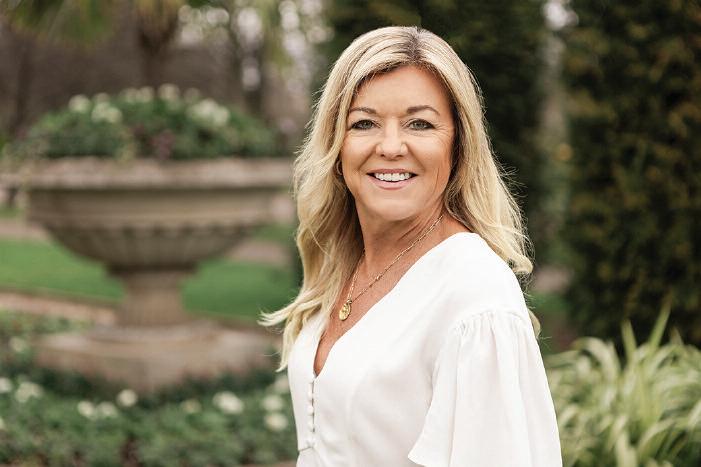
Malnutrition remains a significant issue in care homes where the elderly are particularly vulnerable As a registered dietitian working in the community and in hospital wards often with elderly people who have experienced fall, I wish more people knew about the prevalence of malnutrition and how to combat it before they ended up in hospital
Recent statistics paint a stark picture: Around one in 10 people over the age of 65 are malnourished or at risk of malnutrition and this figure rises alarmingly to 45% among those in their 90s According to the British Association for Parenteral and Enteral Nutrition (BAPEN) malnutrition costs the UK approximately £23 5 billion annually with older adults being disproportionately affected
As the population ages addressing malnutrition and its associated complications, such as frailty and sarcopenia, becomes ever more critical By focusing on early detection and strategic nutritional interventions, including the use of protein, care homes can play a vital role in safeguarding the health of their residents
SPOTTING THE EARLY SIGNS OF MALNUTRITION
The first step in combating malnutrition is recognizing its early signs
The Malnutrition Universal Screening Tool (MUST) is a valuable resource for this purpose enabling caregivers to systematically assess the risk of malnutrition in residents by considering factors such as Body Mass Index (BMI) unintentional weight loss and the impact of acute illness on nutritional intake
KEY EARLY SIGNS TO MONITOR:
1 Unintentional Weight Loss: A significant early indicator of malnutrition is unintentional weight loss Regularly monitoring residents' weight and comparing it to previous measurements is essential A loss of even 5% of body weight over a few months can signal malnutrition and warrants immediate attention
2 Decreased Appetite: A reduced appetite is often a precursor to malnutrition Residents may skip meals, eat smaller portions, or show a lack of interest in food It s important to understand the reasons behind these changes which could be linked to dental issues depression or medication side effects
3 Physical Changes: Signs such as muscle wasting thinning hair dry skin or dental problems may indicate nutritional deficiencies These physical symptoms are often subtle but crucial indicators of potential malnutrition
4 Fatigue and Weakness: Increased tiredness or difficulty performing daily activities can be related to inadequate nutrition This could also signal the onset of sarcopenia where the loss of muscle mass and strength makes everyday tasks increasingly challenging THE ROLE OF NUTRITION IN PREVENTING AND MANAGING FRAILTY
Frailty a condition characterized by decreased strength endurance and physiological function is closely linked to malnutrition and is a major concern in care homes Proper nutrition is key to preventing and managing frailty particularly through the adequate intake of protein which is essential for maintaining muscle mass and function STRATEGIES FOR NUTRITIONAL INTERVENTIONS:
1 Prioritize Whole Foods: Ensuring a diet rich in whole foods is foundational Protein-rich foods like eggs lean meats, fish, dairy products, and legumes should be emphasized as they not only support muscle
health but also provide essential vitamins and minerals that contribute to overall well-being
2 Incorporate Protein Supplements When Necessary: In cases where residents struggle to meet their protein needs through diet alone perhaps due to a lack of appetite or difficulty chewing protein powders or fortified drinks can be effective These supplements can be easily added to meals snacks or beverages ensuring that residents receive the protein they need without overwhelming them with large portions of food
3 Distribute Protein Throughout the Day: Research shows that distributing protein intake evenly across all meals is more effective for muscle protein synthesis than consuming large amounts at a single meal Caregivers should ensure that residents receive adequate protein at breakfast lunch and dinner to maximize the benefits for muscle maintenance and frailty prevention
ADDRESSING BARRIERS TO ADEQUATE NUTRITION
While boosting protein intake is essential we should also address the barriers that may prevent residents from consuming enough nutrients Factors such as taste preferences difficulties with swallowing, or digestive issues can all impact nutritional intake Caregivers should work closely with dietitians to develop personalized nutrition plans that accommodate these challenges potentially incorporating protein powders and other supplements in palatable and easy-to-digest forms NUTRITION IS KEY TO INCREASING HEALTHSPAN
Malnutrition in care homes is a pressing issue that requires vigilant monitoring and proactive management While the numbers alone tell us the stakes are high intervention is more than about reducing costs The ability to stand up from a chair unaided allows our elderly residents independence By spotting the early signs of malnutrition and implementing strategic nutritional interventions, caregivers can help prevent and manage frailty significantly improving the quality of life for residents By addressing malnutrition and frailty head-on care homes can help residents not only avoid the adverse effects of these conditions but also thrive in their later years

WHAT IS DYSPHAGIA?
Dysphagia is a medical condition that makes swallowing food and drink more difficult Depending on the severity some textures may be more difficult to swallow or somebody may have lost the ability to swallow at all Regardless this can make mealtimes much more difficult, which is why care home caterers must know about this condition and how to support those who have it
A few conditions can cause dysphagia including cancer head injuries a stroke or dementia Age can also play a role in developing this condition meaning there could be a higher likelihood of some residents suffering from this EFFECTS OF DYSPHAGIA
Dysphagia doesn’t just affect mealtimes – it can also: Impact on quality of life: If somebody is no longer able to eat and drink as they ve been able to they may become withdrawn and develop a low mood The change can be difficult to get to grips with which is why supporting residents through their dietary transition and making sure they’re properly catered for is so important
Lead to malnutrition and dehydration: A lack of food and drink due to not being able to swallow or chew properly can mean that residents aren’t properly hydrated or receiving enough nutrition This can result in lower energy levels and in more extreme cases can also lead to further health complications
• Cause choking: Without specialist catering somebody with dysphagia may not be able to swallow their food which can be a choking hazard
FRAMEWORK?
By Rob Henry,
Head of Culinary Solutions and Compliance at EF Group (www ef- group co uk)
dysphagia who have trouble chewing and swallowing Using this framework caterers in the care industry can determine which foods and drinks would be easiest for people with this condition to consume IDDSI consists of eight levels ranging from 0 to 7 with drinks ranging from 0 (thin) to 4 (extremely thick) and foods ranging from 3 (liquidised) to 7 (regular and easy to chew) These indicate the texture and thickness of foods and drinks and give some steer as to which ones would be safest for somebody with dysphagia to consume
ADDITIONAL CONSIDERATIONS FOR CATERING TO
DYSPHAGIA
When you’re preparing to cater for residents with dysphagia there are a few extra things you might need to consider These include:
Training your staff on the IDDSI framework: Ensuring your staff understand the framework what it means and how to apply it is crucial Holding training sessions on this can make sure everybody is on the same page when it comes to catering to the needs of residents with dysphagia
Knowing when to modify the menu to resident needs: Once your team are trained on the IDDSI framework, this must be implemented into your catering practices This should involve assessing each resident’s dietary needs to see if they require modifications and monitoring this over time in case further changes are needed
Getting in the correct nutrients and fluids Alongside modifying diets based on what is easiest for residents to consume you should be ensuring all residents are properly hydrated and receiving a balanced and nutritious diet Whether their food is liquidised, regular or somewhere in between hydration and nutrition must never be reduced even though you might need to alter the way these are offered to residents
Making mealtimes more enjoyable: If somebody has been living with dysphagia without a modified diet they may need some extra encouragement at mealtimes once the modifications have been made Try making mealtimes social introducing different flavours or recipes and regularly rotating menu options to keep them interested and more likely to finish their food
Supporting residents with dysphagia is a key duty of caterers in the care industry and can have a huge impact on their wellbeing, health and quality of life Therefore, it’s vital that your catering team are aware of the signs of the condition and how the IDDSI framework can be used to prescribe a better approach to their mealtimes
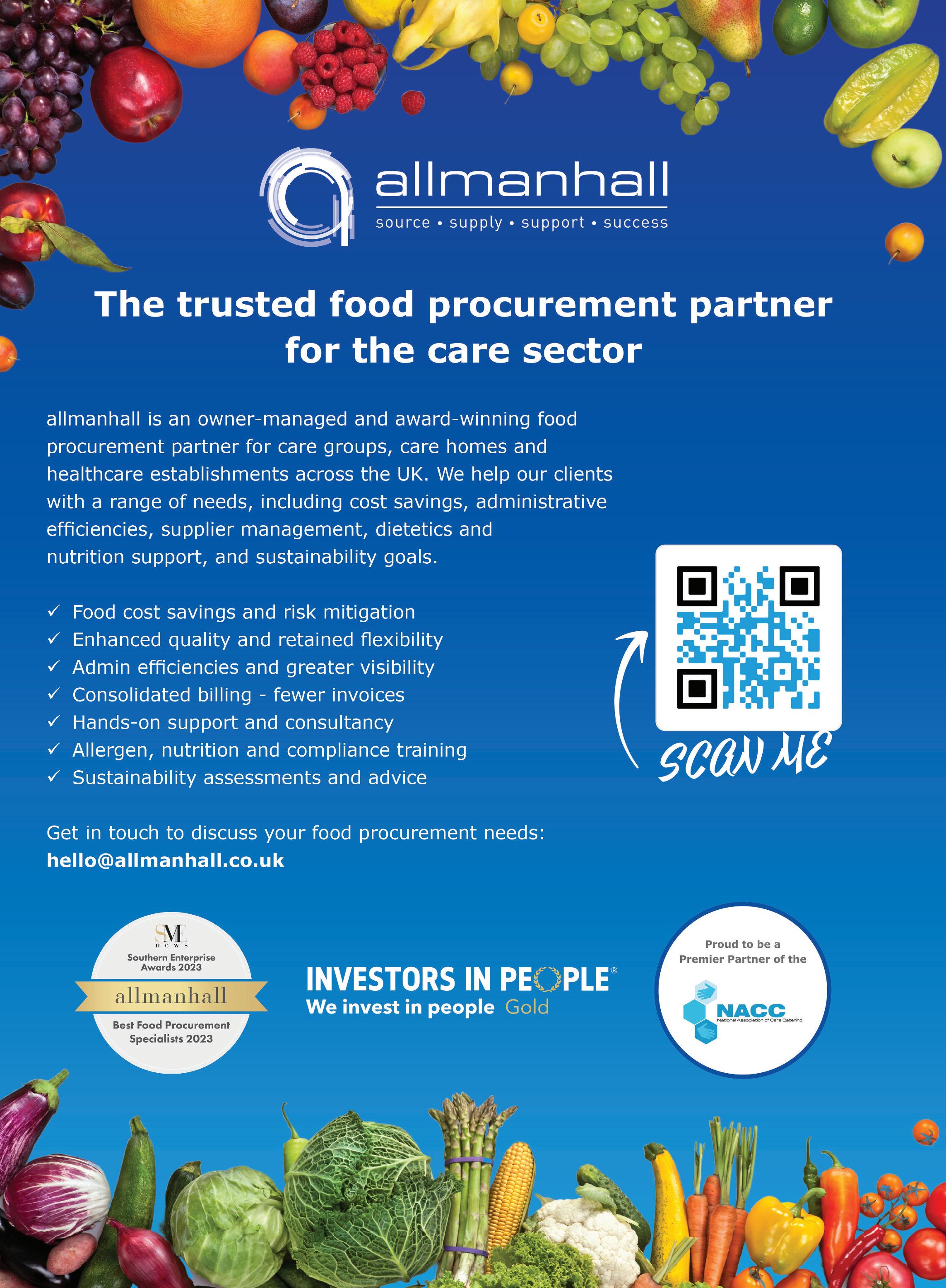
Food procurement specialists allmanhall, explore the importance of nutrition and hydration in older people specifically considered for a dignified and person-centric dining experience
Proper nutrition and hydration are critical in care homes directly impacting the health wellbeing and overall quality of life for residents Research by BAPEN reveals that malnutrition affects 35% of care home residents in the UK leading to a variety of health issues including increased infections, poor wound healing mental health decline social isolation and increased frailty This underlines the need for a comprehensive person-centric approach to food and drink in these environments
As people age the risks of malnutrition and dehydration increase compounded by the natural decline in thirst reflex and in some cases cognitive impairments such as dementia These factors make it challenging for older individuals to maintain adequate nutrition and hydration Therefore it s crucial that care home staff adopt a dignified approach to meals, recognising that the involvement in making choices about food remains important even when other capacities are diminished

At a recent National Association of Care Catering (NACC) Seminar care professionals emphasised the significance of creating a positive mealtime experience Engaging residents in conversations about their food preferences understanding their personal histories and ensuring that texture-modified meals are both nutritious and appealing are vital steps in enhancing mealtime satisfaction
Hydration is equally important playing a key role in bodily functions and the prevention of conditions like urinary tract infections and chronic renal disease Strategies to encourage fluid intake include offering a
variety of beverages, promoting "hydration hour" with mocktails, and providing high-fluid-content foods like soups and yogurts It s also important to educate care home staff on recognising signs of dehydration which can manifest as tiredness headaches and poor concentration
Nutritionally care homes should focus on nutrient-dense foods rather than calorie-dense ones Incorporating ingredients like eggs seeds, and Greek yogurt can help ensure that residents receive essential nutrients Additionally increasing dietary fibre through foods like whole grains, legumes, and unpeeled fruits can support digestive health and reduce the risk of conditions such as diabetes and heart disease It's important however to introduce fibre gradually to avoid digestive discomfort
For residents with dysphagia a condition that impairs swallowing care homes must offer texture-modified diets that are both safe and nutritious Providing adequate training for staff on preparing these meals, ensuring that they are nutritionally fortified, and enhancing flavours with herbs and spices can make these meals more enjoyable for residents
In conclusion providing a holistic person-centric dining experience in care homes is essential for maintaining the health and dignity of residents By focusing on nutrition hydration and individual preferences care homes can significantly enhance the quality of life for their residents
The mealtime experience is so much more than just food Care establishments across the UK are partnering with allmanhall to manage their food procurement achieve savings and improvements and to access support to enhance the overall dining experience Get in touch – hello@allmanhall co uk
no-melt formula resulting in shelf-stable ice cream products that can be enjoyed by everyone SCREAMIES ice-scream also never gets softer than IDDSI Level 4 making it the perfect treat for those with dysphagia

market
Launched in 2016 SCREAMIES is a brand with one purpose: to deliver the taste of sumptuous old-fashioned ice cream and make it accessible to everyone Each SCREAMIES product is created with a spe-
As well as the traditional three flavours Screamies offers Chocolate and Salted Caramel with added Protein for those with additional nutritional needs With a long shelf life Screamies can be stored at ambient temperature and frozen when the time suits Flavour Creations also offer a wide range of market leading supporting products for those looking to provide something extra to patients Pre-thickened Ready to Drink ranges include in excess of 20 flavour profiles Advital nutritionally complete powder comes flavoured and neutral and is used in snacks like Advital chocolate mousse and Fruits with Attitude Flavour Creations also supply high quality moulds and Shape It to assist with food preparation at all IDDSI levels
To find out more simply contact Albany Products at enquiries@albanyproducts co uk or call on 01706


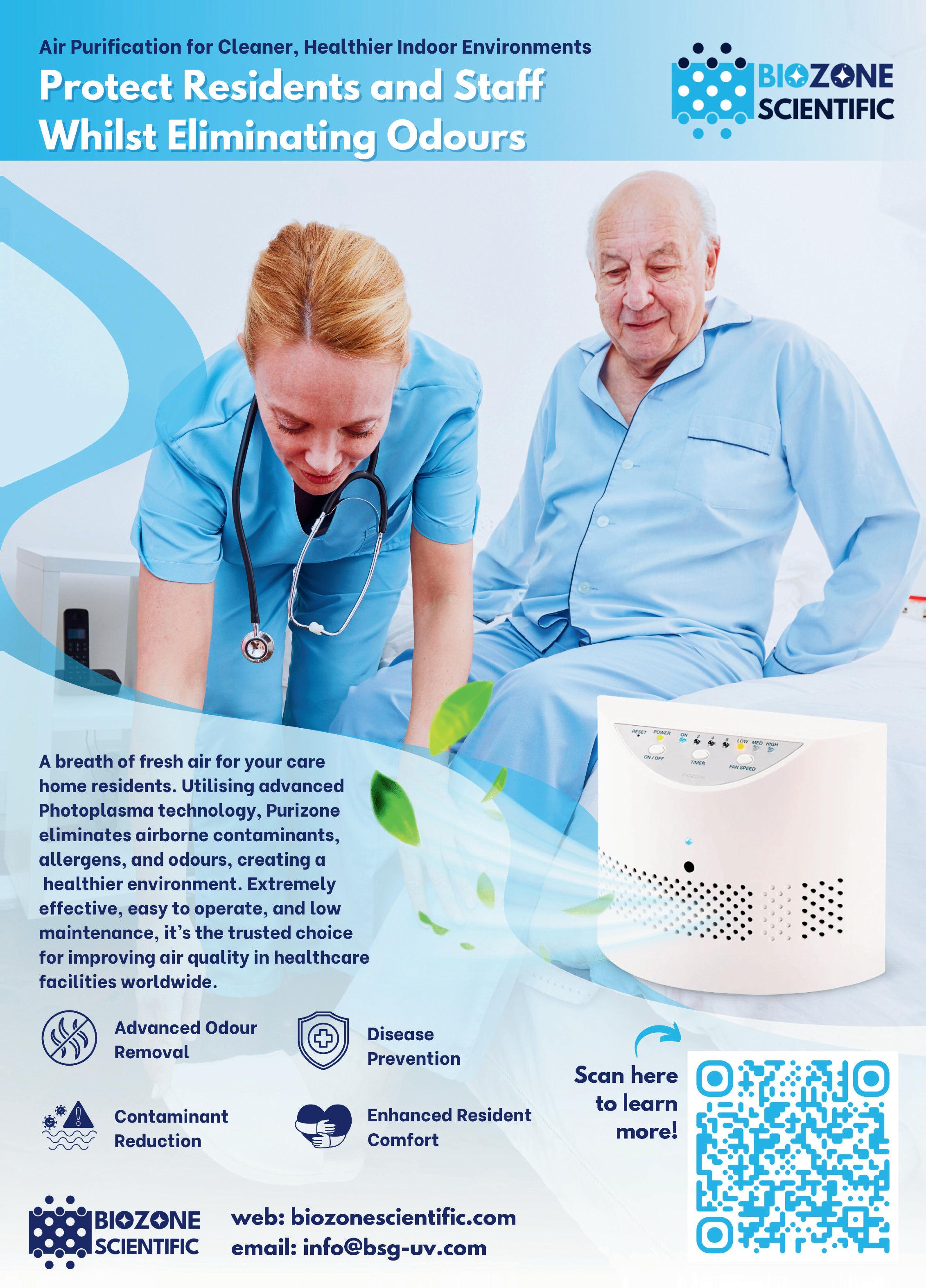



Oxy-Gen
This
Oxy-Gen
All
Carbon
With
See






When




By Scott Williamson, Managing Director,

In the ever-changing and often demanding environment of residential and nursing care homes prioritising the well-being of residents is paramount As care providers it is imperative to explore innovative methods to enhance the quality of life for those in care especially individuals living with cognitive impairments such as dementia One highly impactful method embraced in recent years is sensory stimulation a comprehensive approach that enhances physical, emotional, and cognitive well-being With the integration of advanced AI technology, newer technologies such as personalised, relaxing music videos breathe new life into old black-and-white photos by colourising them accompanied by soothing music captivating landscape visuals and cherished family photos or video messages This provides a distinctive way to deliver a holistic, sensory-enriched experience that significantly benefits elderly residents and those with dementia
DIVERSE FORMS OF SENSORY EXPERIENCES
There are many ways to incorporate sensory experiences into daily care each offering unique benefits for residents
1 Visual Stimulation: Personalised relaxing music videos use serene natural landscapes and family memories to captivate residents' visual senses These familiar images, paired with scenic backdrops evoke positive emotions and comfort Advanced technologies such as AI-powered colourisation of old black-and-white photos bring memories of the past to life enriching the experience further by reconnecting residents with their personal history
2 Auditory Stimulation: The choice of music in these videos is key Rather than familiar music that may evoke specific emotions or memories soothing and non-intrusive sounds are purposefully chosen to enhance deep relaxation and open the senses to help immerse themselves in the visuals and relax without the distraction of nostalgia, allowing for a more profound sensory experience
3 Tactile Stimulation: Personalised videos can be paired with tactile activities to further engage residents Watching these calming visuals while interacting with textured objects fidget blankets or engaging in simple activities like handling soft fabrics can provide enhanced comfort and sensory richness
4 Olfactory Stimulation: While videos alone do not engage the sense of smell pairing them with aromatherapy sessions using calming scents like lavender or invigorating fragrances like citrus can amplify the relaxation experience making it more immersive and holistic
5 Gustatory Stimulation: Taste experiences can also complement sensory videos For example, while watching
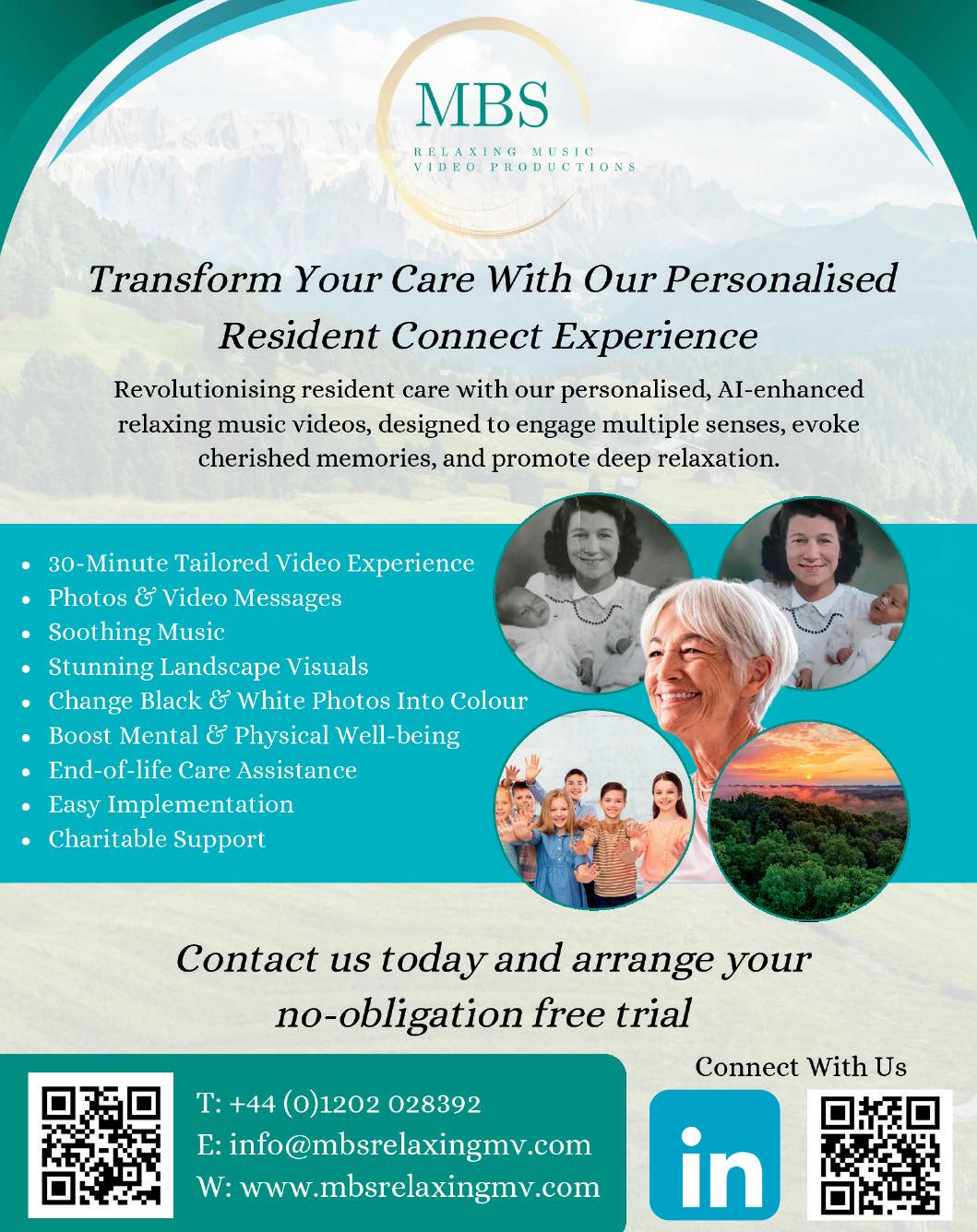
THE
personalised landscapes or family-themed videos, residents can engage in taste sessions, trying familiar and comforting flavours adding another dimension to the sensory experience
The implementation of sensory stimulation has wide-reaching benefits that can positively impact residents' emotional, psychological, and physical health Regular sensory activities offer the following advantages:
- Reduction in Agitation and Restlessness: Especially for residents with dementia, these videos create a sense of familiarity and calm reducing anxiety and behavioural issues
- Improved Cognitive Function: Engaging residents’ brains through visual and auditory stimuli helps maintain and in some cases improve cognitive abilities providing meaningful engagement
- Enhanced Communication: Residents who struggle with verbal communication often respond emotionally or cognitively to visual and auditory cues Personalised videos offer alternative ways for residents to express themselves facilitating greater interaction
- Increased Social Interaction: When shared in group settings, these videos encourage social engagement, helping reduce feelings of isolation and loneliness
SENSORY STIMULATION FOR DEMENTIA PATIENTS
For dementia patients sensory stimulation plays a particularly important role in their care Personalised videos offer structure, evoke memories, and facilitate moments of connection between residents and caregivers or family members Combining these videos with other sensory activities such as memory boxes filled with personal items can deepen the experience, triggering memories and meaningful conversation
CREATING SENSORY ROOMS IN CARE HOMES
Many care homes have found success in creating dedicated sensory rooms Personalised relaxing music videos are ideal for use in these spaces where they can be combined with soft lighting calming scents and tactile objects to offer a fully immersive environment These sensory rooms provide a tranquil retreat for residents allowing them to engage multiple senses in a way that is soothing and beneficial
THE POWER OF VISUAL LANDSCAPES FOR SENSORY STIMULATION
Visual landscapes such as nature scenes are an invaluable tool for sensory stimulation For residents who may no longer be able to experience the outdoors firsthand, these videos offer a powerful connection to the natural world Scenes of oceans forests or mountain views have been shown to reduce anxiety alleviate stress and promote mental well-being The immersive quality of these visuals when combined with soothing music provides a window to the outside world offering comfort and emotional enrichment for residents who may feel disconnected from nature
AI TRANSFORMING RESIDENT CARE
The integration of AI into sensory stimulation is revolutionising how care homes approach resident wellbeing AI technologies such as the colourisation of old photographs help residents reconnect with their past in vivid detail These enhanced visuals combined with calming music and personal video messages from loved ones create a multi-sensory experience that reduces anxiety and promotes emotional well-being This innovative use of AI not only improves the sensory experience but also strengthens cognitive function making it an essential tool in modern care homes
THE VALUE OF PHOTOS AND VIDEO MESSAGES FROM LOVED ONES
Incorporating photos and video messages from loved ones adds an emotional layer to sensory stimulation Seeing familiar faces and hearing the voices of family members triggers emotional recognition which can provide comfort and reduce anxiety especially for those experiencing memory loss This personalised approach creates meaningful connections stimulating both visual and auditory pathways and offering moments of joy and clarity for residents
Moreover video messages combat feelings of loneliness and isolation Residents feel a stronger sense of belonging and connection to their loved ones, even if they cannot be physically present This can significantly enhance their overall well-being contributing to a more enriching care environment
SENSORY
Sensory therapy particularly 30-minute video experiences serves as a versatile tool for structured activities With the ability to loop the videos for longer experiences caregivers can find moments of respite while enhancing the well-being of residents Creating a calm and engaged environment through sensory videos can improve the caregiving experience and reduce caregiver burnout
CONCLUSION
The integration of sensory stimulation, particularly through personalised AI-enhanced relaxing music videos offers a transformative approach to improving the well-being of residents in care homes By engaging multiple senses including visual, auditory, tactile, olfactory, and even gustatory, these videos provide a holistic and enriching experience that benefits both residents and caregivers For individuals living with cognitive impairments like dementia these sensory experiences evoke memories reduce anxiety and foster emotional connections
The use of advanced AI technologies such as the colourisation of old photos combined with serene landscapes, soothing music, and messages from loved ones, adds a deeply personal and meaningful dimension to the care environment The implementation of sensory rooms and dedicated sensory activities not only enhances residents' physical and emotional health but also offers caregivers a valuable tool for creating a calm structured environment As care homes continue to evolve embracing sensory therapies will remain essential in promoting a higher quality of life for elderly residents and those living with dementia



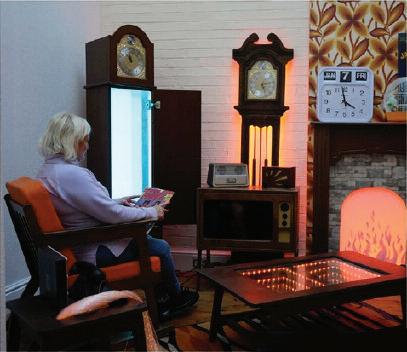

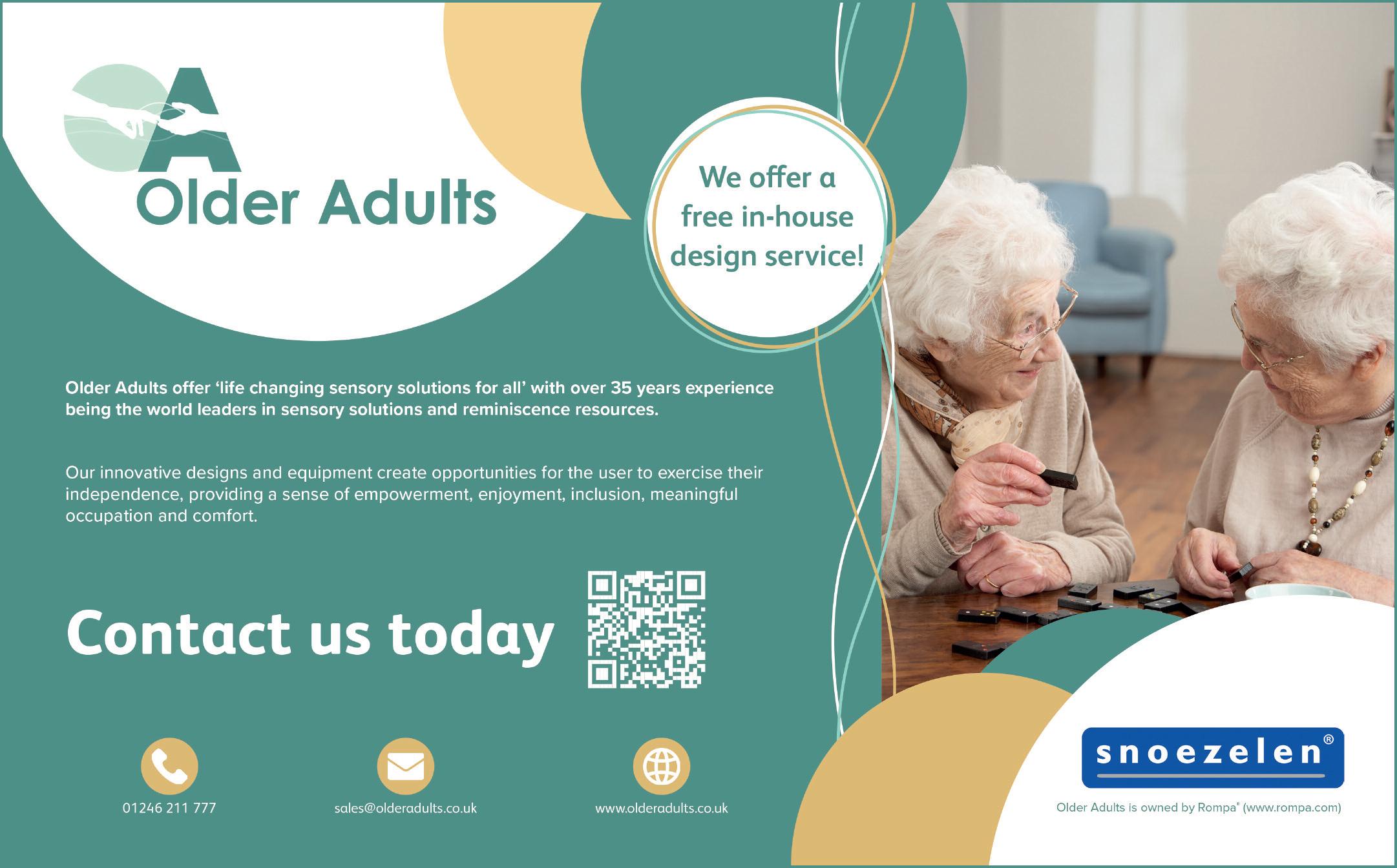
By Hervé Chapron, SVP & General Manager EMEA, Semarchy (www semarchy

Safeguarding sensitive data and cybersecurity in the care sector remains a major concern, calling for a high degree of data integrity
Yet a recent report revealed that 30% of CQC registered care provider locations lack up-to-date security measures This alarming statistic highlights the urgent need for a robust data management system to protect devices resident confidentiality clinical outcomes and financial resources
PREVALENCE OF CYBERSECURITY THREATS
Recent statistics on cyber-attacks targeting healthcare and care providers are worrying The European Repository of Cyber Incidents has recorded a significant increase globally with the number of events rising from 32 in 2022 to 121 in 2023 This rise exposes the critical vulnerabilities that care providers face Care England outlines several specific threats including data breaches that involve unauthorised access to resident or staff records leading to identity theft fraud and privacy violations Ransomware attacks are another major threat where malicious software can encrypt critical files, rendering them inaccessible until a ransom is paid
Phishing scams are a further concern as fraudulent emails or messages may trick staff or residents into sharing sensitive information or clicking on malicious links
Cybercriminals can also exploit network vulnerabilities due to weak infrastructure or outdated software and hardware to infiltrate systems Therefore healthcare providers must understand and address these vulnerabilities to prioritise cybersecurity measures and stay vigilant against evolving threats
Equally outdated or insufficient security measures can place some healthcare providers at significant risk of digital exclusion, impacting the care homes future As the world increasingly relies on technology, those who lag in adopting sufficient cyber defences may find themselves left behind PREVENTING DISRUPTIONS
Ransomware attacks and data breaches can incapacitate care facilities Recently in the UK a blood testing centre for the NHS was targeted in a ransomware attack Personal patient data was compromised and there were significant delays in patient care Attacks like these These attacks not only compromise care resident’s confidentiality but can also disrupt essential healthcare services Such disruptions create a domino effect potentially placing numerous lives at risk
Operational efficiency also suffers Care facilities may face hefty fines for not protecting their resident s information plus the costs of restoring data and systems
Ensuring seamless and uninterrupted care services is essential for the well-being of care residents, and the protection of carers as well Secure data systems play a crucial role in maintaining high service quality by enabling continuous healthcare delivery PROTECTING RESIDENT CONFIDENTIALITY
Respecting care resident s privacy rights isn t just an ethical requirement but also a legal obligation
Implementing the following three actions will ensure care facilities comply with both:
• Multi-factor authentication (MFA)
Implementing MFA to your internal system introduces additional security layers, requiring external verification for login access This measure significantly diminishes the risk of unauthorised access as a potential intruder might breach the first security layer but will be stalled at subsequent ones
• Employee Training
Educating staff on data security and best practices such as recognising phishing attempts and crafting secure passwords is crucial This boosts their awareness and minimises human errors that compromise the system
• Data Encr yption
Care providers can add a critical layer of security by encrypting resident data both during transmission (in transit) and while stored (at rest) Encryption renders the data unreadable to unauthorised people protecting sensitive information from potential breaches
ENHANCING CARING OUTCOMES
Care providers who manage multiple facilities can find it challenging to keep up with increasing data volume and complexity from a multitude of sources Knowledge transfer can also be problematic with highsecurity risks There is both the data from the business and the data of care residents that needs to be protected
However with a comprehensive data management system care providers can leverage the power of all data, regardless of source, to ensure data integrity When data is correct and readily available, decisionmakers can rely on it to make well-informed choices that enhance operational efficiency and strategic objectives
Data management systems are indispensable in healthcare for protecting devices securing patient confidentiality, enhancing clinical outcomes, and safeguarding financial resources As cyber threats evolve, the care industry must remain vigilant and consistently update its cybersecurity practices to stay ahead of risks and ensure optimal protection for all stakeholders but most importantly the people they care for

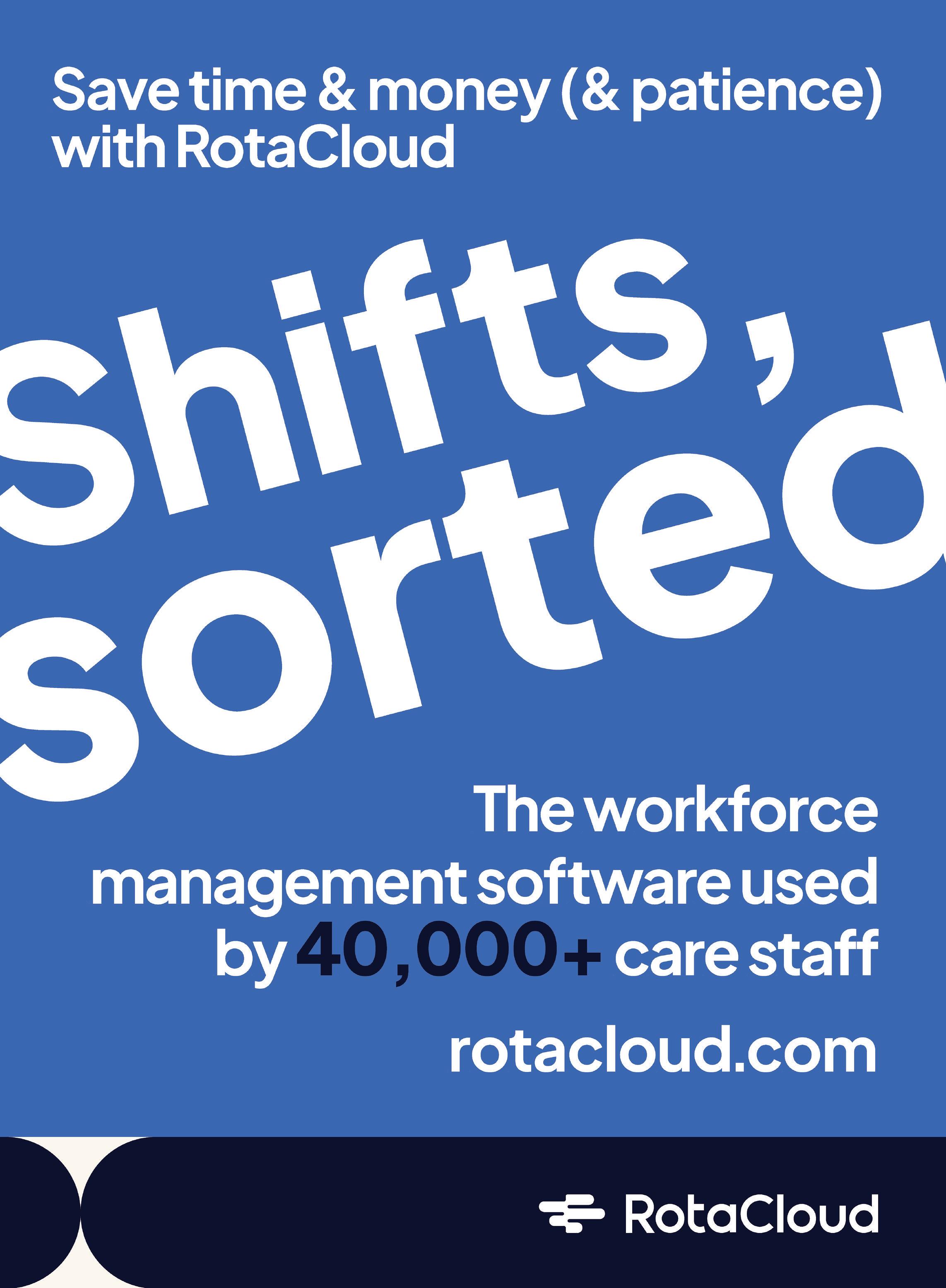


Ensuring













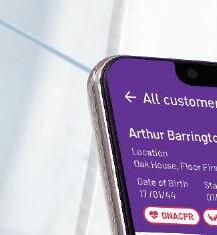














































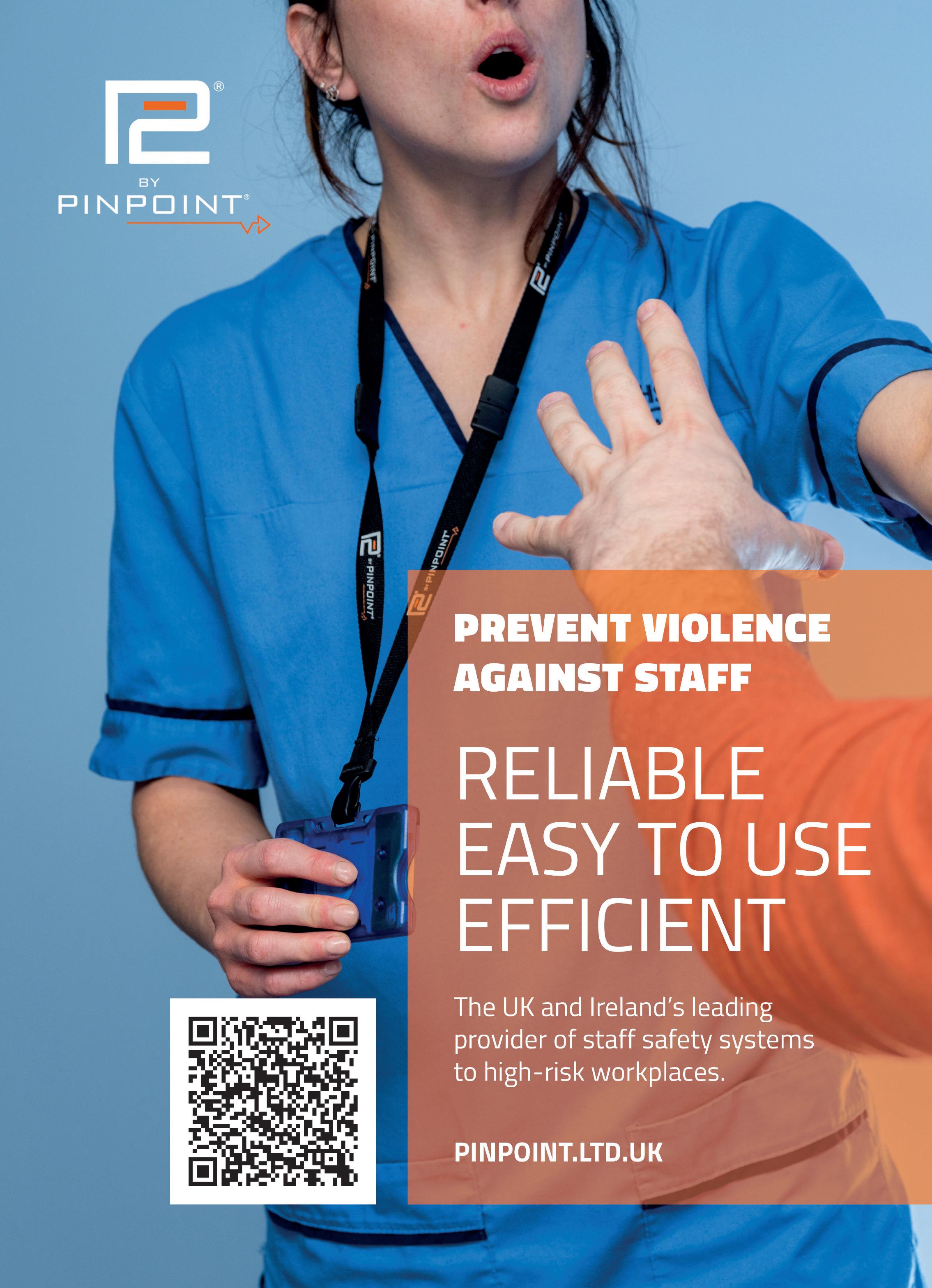




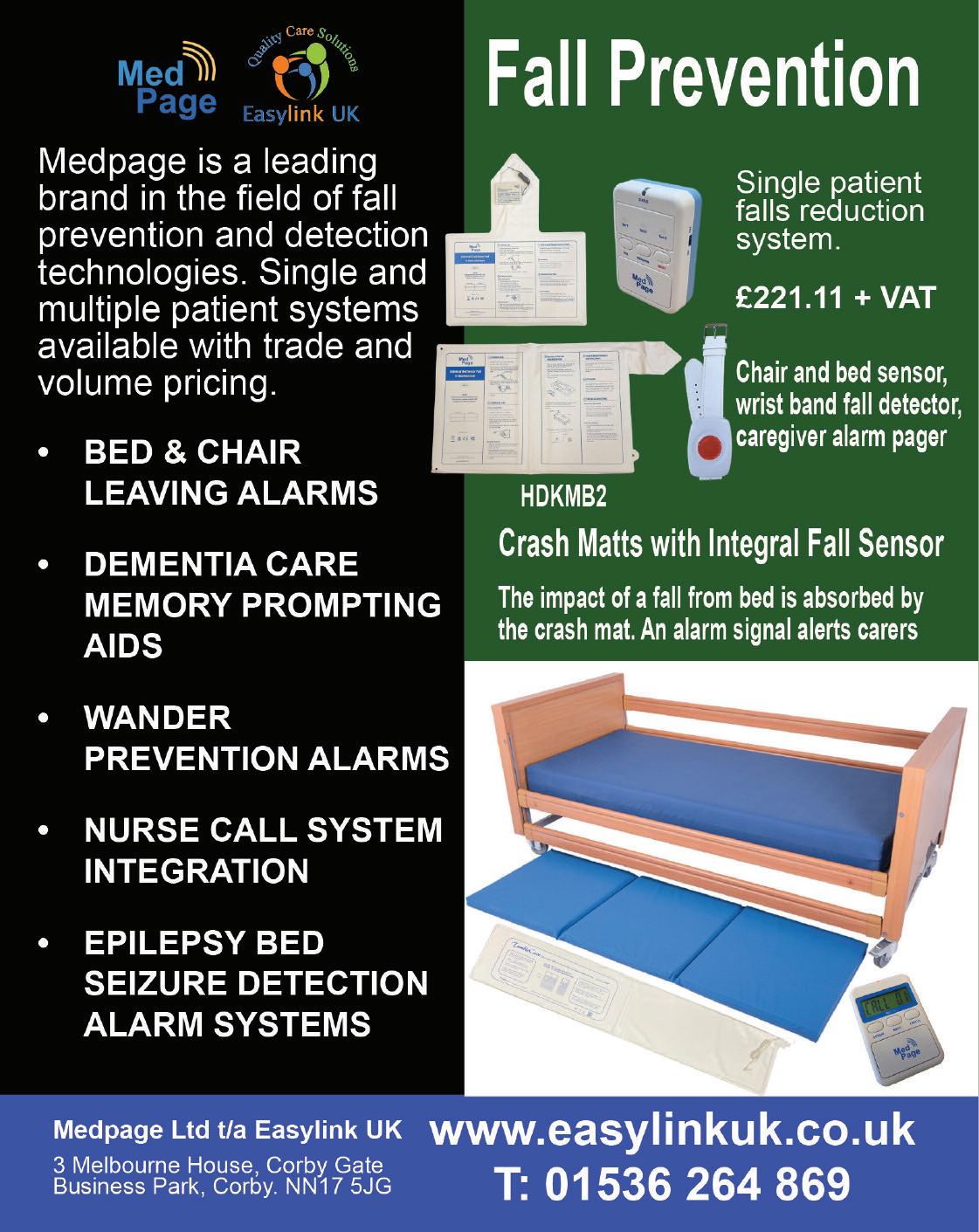
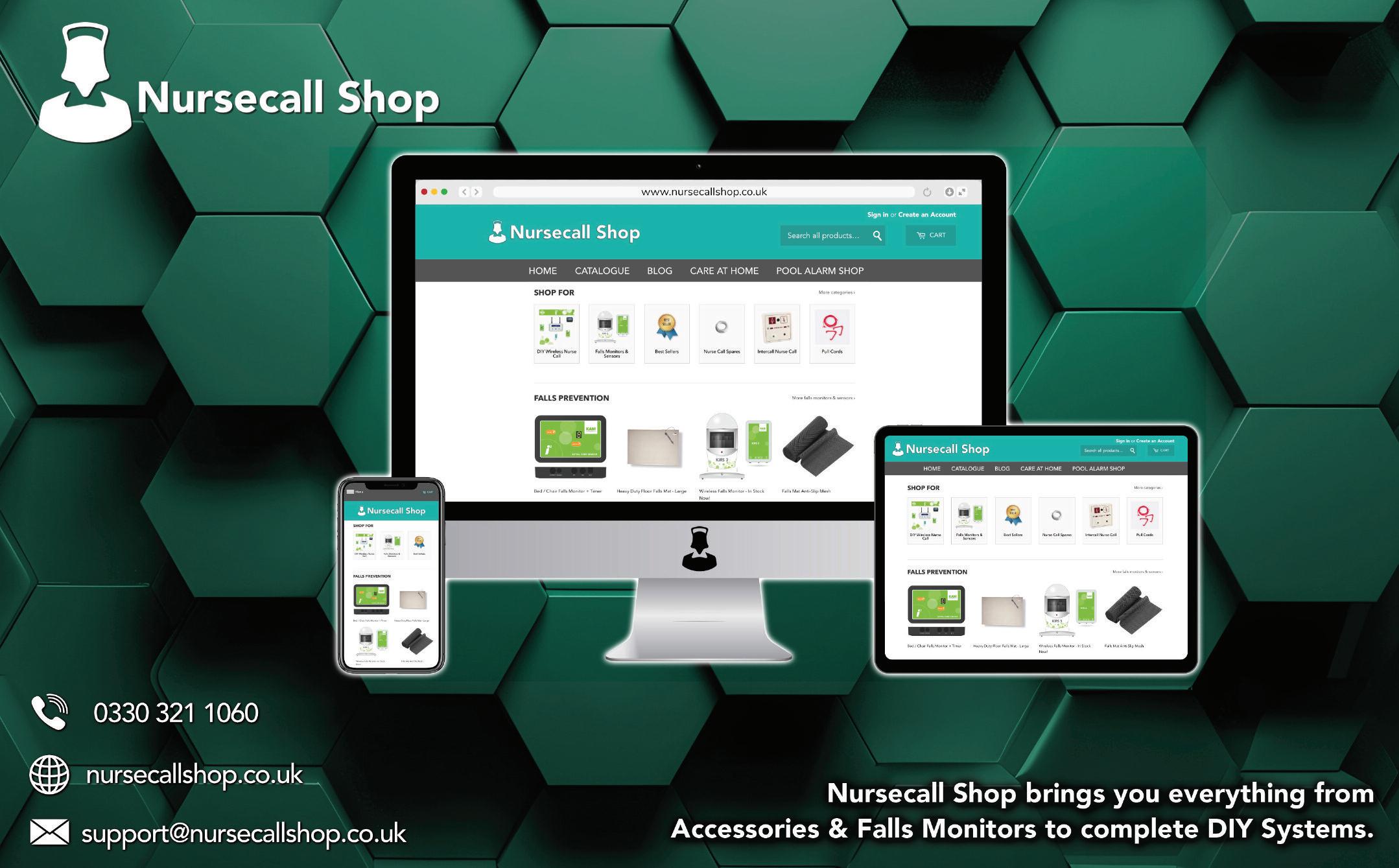
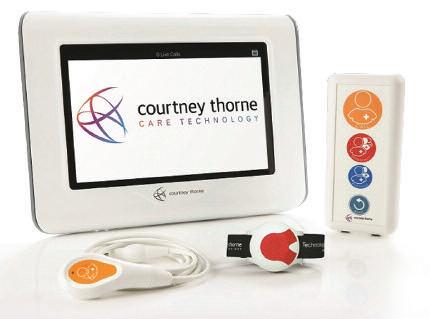


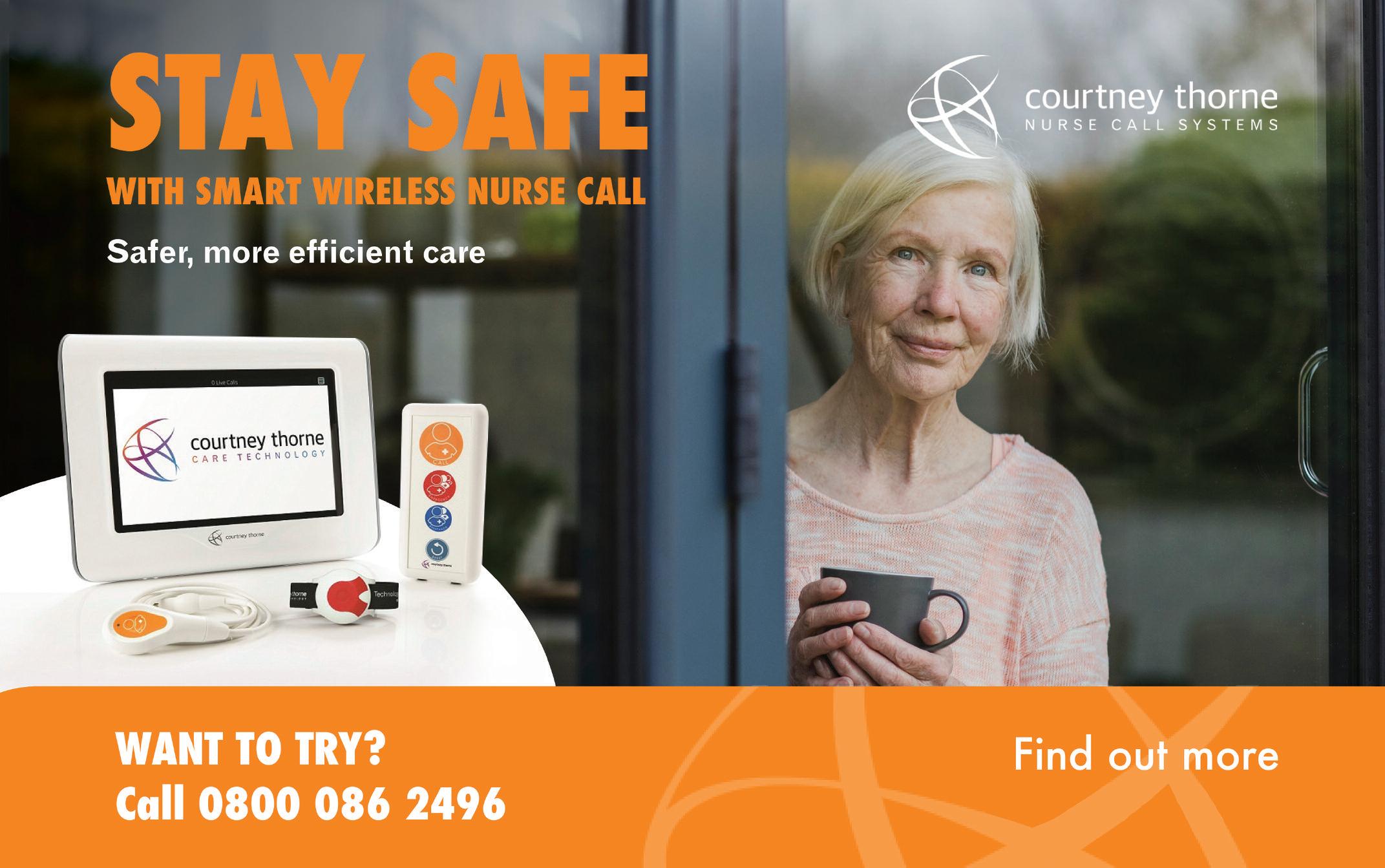
Explore the Char ted Manager Degree Apprenticeship (CMDA) with Mar y Seacole at the University of Exeter
Have you ever wondered about advancing your career, but unsure how to gain the qualifications required whist working? There is an ever-increasing demand for skilled managers within the care sector, and having practical experience is just not enough to fill those positions
Gaining a BSc (Hons) in Responsible Business Manager and



Diplomas have the potential to empower individuals and are the best route for most health and social care professionals to progress according to an expert at leading training provider Realise
Lesley O Connor Head of Health and Social Care at Realise said diplomas are a strong option as they are flexible, can usually be fully funded and can be tailored to the particular needs of the employer and the learner
Diplomas are also attractive to employers as they require little administration
Lesley said I think there is still a lack of awareness and some misconceptions around diplomas Sometimes people believe apprenticeships are their only option and they don t realise diplomas are available under funded provision for those who are eligible
“Some employers also mistakenly believe that diplomas are completed entirely online but in fact they are very hands-on and practical This approach helps learners apply theoretical knowledge directly to real-world scenarios, which is a major advantage
“Our diplomas are recognised and trusted by employers in the health and social care sector They meet national standards which means learners hold a qualification that is valued and trusted
“If a candidate does not meet the eligibility criteria for a diploma then alternative routes will need to be explored Otherwise I would nearly always recommend a diploma as a fantastic way to expand knowledge and skills ” Under the Adult Skills Fund diplomas are usually fully funded for anyone aged 19 and over, as long as they have lived in the UK for three years There are some other eligibility requirements in devolved areas – and in some areas workers from overseas can start a diploma as soon as they arrive in the country under a Health and Care Worker visa

Learners can also qualify for funded diplomas if they earn below the low wage threshold which varies from area to area The thresholds have recently been raised in various authorities to £35 000 a year in Liverpool for example and £27 500 a year in West Yorkshire
Realise offers Level 2 diplomas in all non-devolved regions for England and Liverpool City Region
The provider also offers Level
Lesley
“Helping learners find the right programme for them is central to the Realise ethos Some learners will be able to enter at Level 3 if they re in the right job role even if they don’t have another diploma





power of play and peer learning See our advert on the front cover or visit www FocusGames com
Social Care TV continue to fly the flag for highest quality online training for Health and Social Care after unwavering commitment to excellence within the sector for over 25 years
Their widely-used health and social care specific courses - produced and edited in-house - are expertly designed to make learning engaging informative and therefore highly effective for learners
Accredited by CPD and endorsed by Skills for Care, training with Social Care TV is quality assured, comprehensive and relevant
As one of the leading online training providers in the health and social care sector in the UK they supply training for local authorities recruitment agencies care home groups and other health and social care organisations
Their feature-rich Manager platform has further been enhanced this year with the introduction of several new Manager tools designed to aid with compliance reporting and trainee management Features now available include:
Compliance Dashboard with Traffic Light System

and
SCTV regularly
To enhance their learners experience further they have created free, comprehensive subject-specific workbooks which were rolled out across all courses this year This unique addition provides excellent value and a fully robust training package

But
By Daniel O ’Shaughnessy, Programme Manager - Better Security, Better Care, Digital Care Hub

Check
Strengthen
continuity plan: Ensure it covers how you will manage if you were to lose access to data for a period of time Watch out for our new cyber incident response checklist – coming in October for Cyber Security Awareness Month
Create back-ups Identify what data is essential to running your service, and create a backup separate from


Founded

quality

Mike Whitehead CEO of Danforth Care commented: “Since day one our mission has always been to create a home-like atmosphere for our residents that is safe, secure, and encourages independence We are committed to providing the highest quality of care and services to our elderly residents and we strive to create a place where they can be comfortable while feeling respected and valued The support from Warwick and the financial backing they received from OakNorth will help accelerate our growth highlighted by our expectation to open seven further homes in the coming months ”
Deepesh Thakrar, Senior Director of Debt Finance at OakNorth added: “We were delighted to support Warwick on this project as it emphasises our strong ambitions to do more to
seen them

Email:
